|
10 The Bayle
Bail Street

Folkestone
https://whatpub.com/british-lion
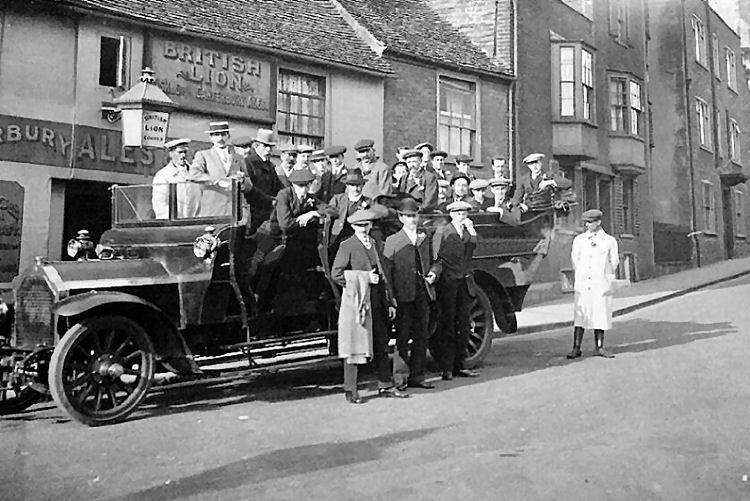
Above photo 1920, kindly sent by Rory Kehoe. |
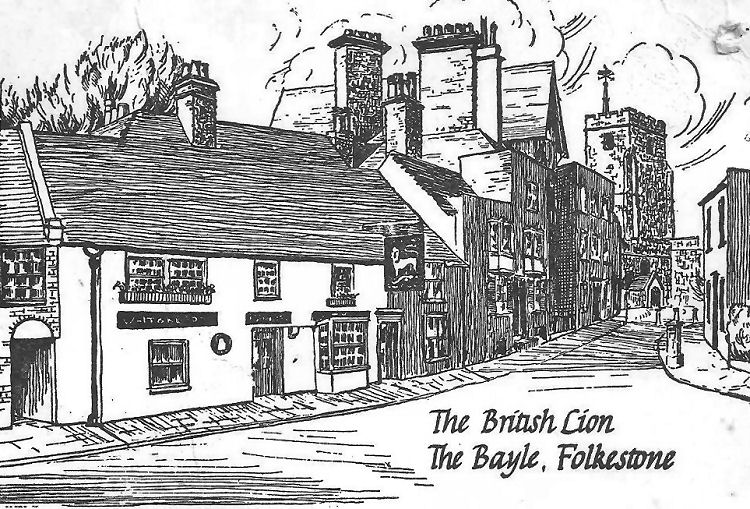
Above postcard, 1971, kindly sent by George Trotter. |

Above photo, 17 October 1989, by Jim Ashby. |
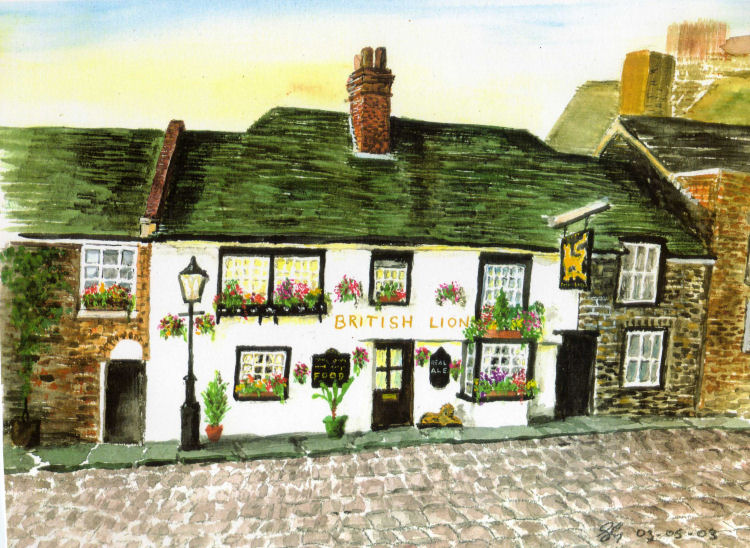
Above watercolour 2003 by Stuart Gresswell, once licensee of "Guildhall"
and "Raglan" kindly sent by Jan
Pedersen. |
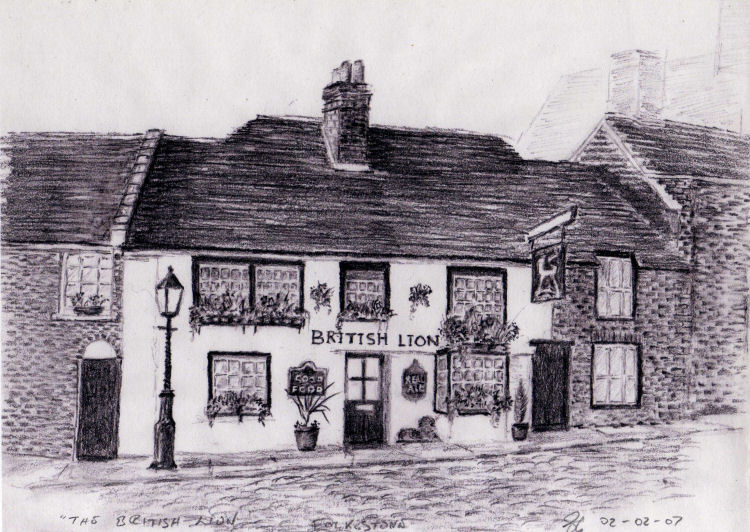
Above watercolour 2007 by Stuart Gresswell, kindly sent by Jan Pedersen. |
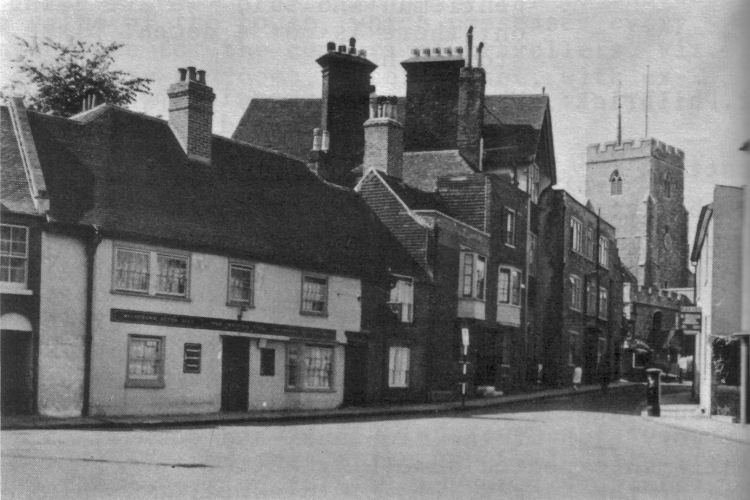
Above showing the British Lion, date unknown. |
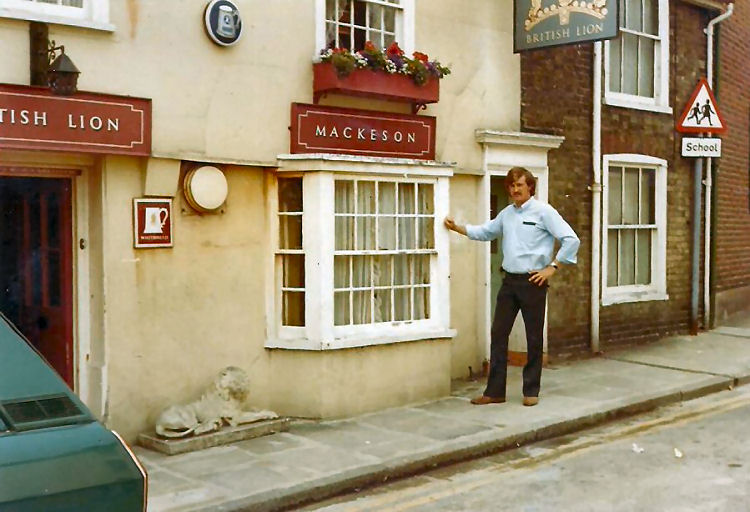
Above photo 1971, sent by and showing Australian bar worker George Trotter. |
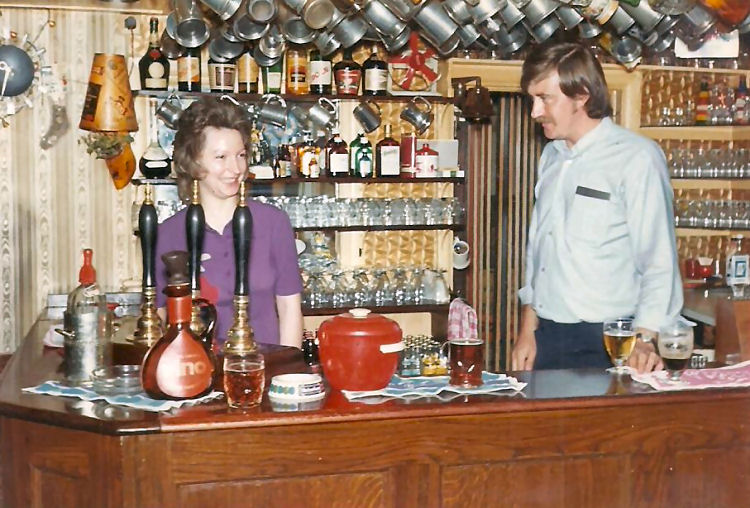
Above photo 1971, sent by and showing Australian bar worker George Trotter and
un-named bar-maid. |
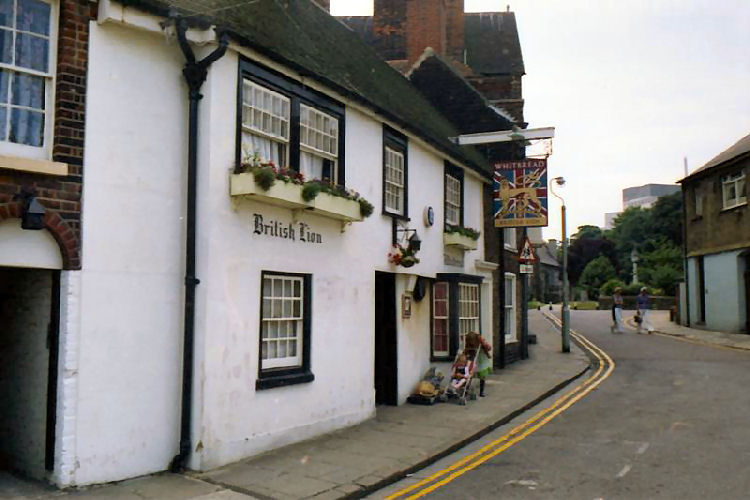
Above photograph kindly supplied by Jan Pedersen, 1978. |
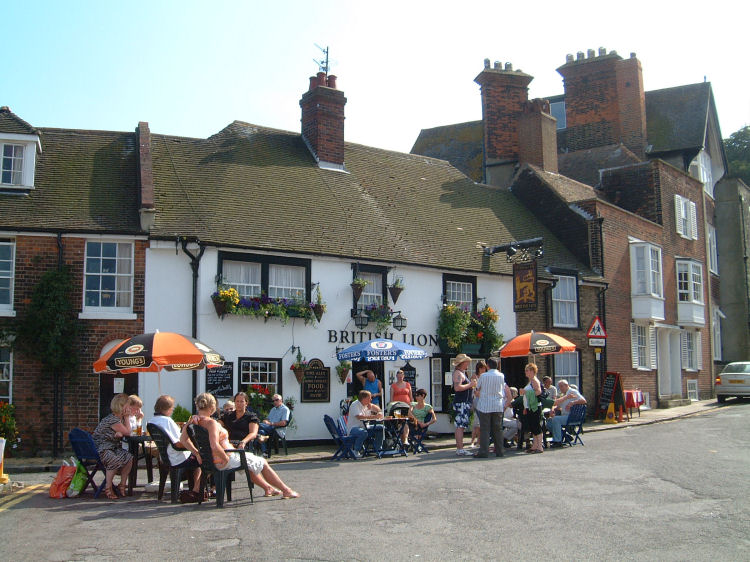
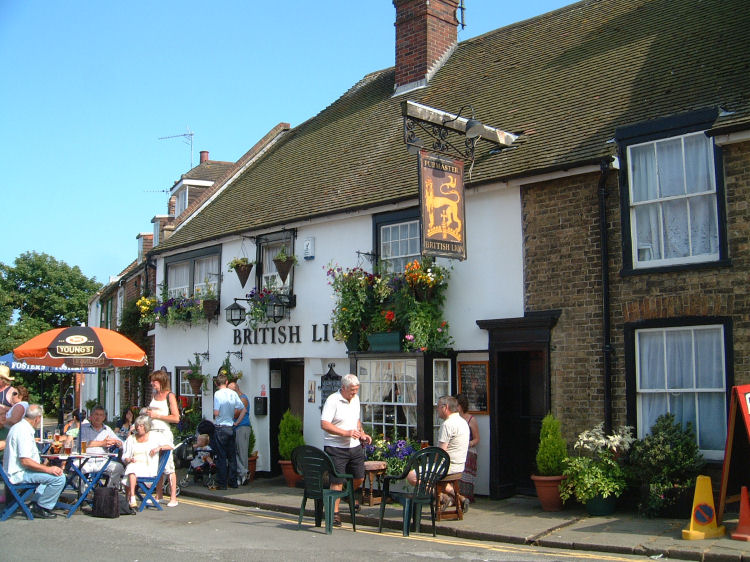
Above photos by Paul Skelton, 27 June 2009.
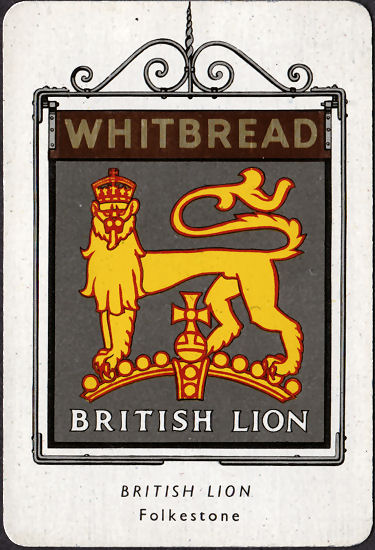
Above aluminium card issued June 1951. Sign series 3 number 6. |
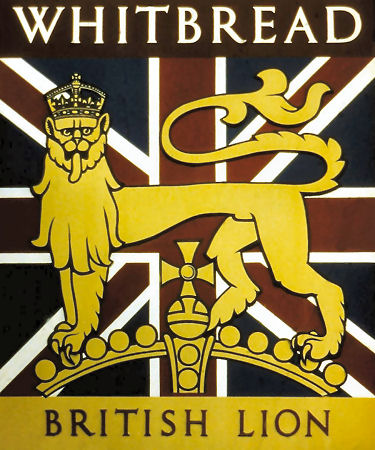 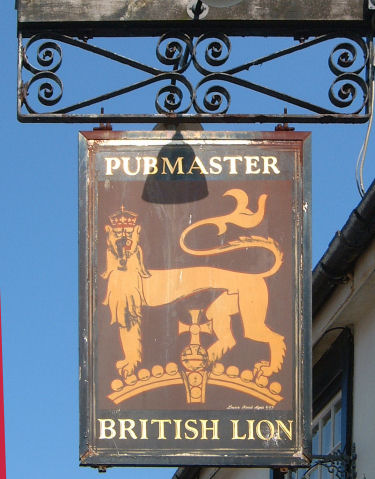
Above sign left, 1986, sign right June 2009.
With thanks from Brian Curtis
www.innsignsociety.com. |
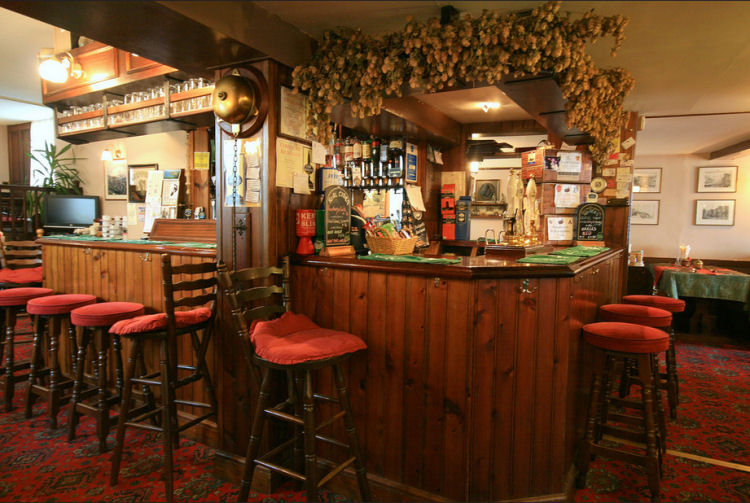
Photo taken 16 October 2010 from
http://www.flickr.com
by Jelltex. |
The "British Lion" was a favourite resort of Charles Dickens between
1857-63, and has its own Dickens Room. There may have been an inn here since
1460, known as the "Priory Arms,"
and in 1995, local historian Eamonn Rooney discovered that a large portion
of one of the walls that still stands was once part of a late medieval
priory, but proper records start in 1782.
I also believe that another pub identified as being in the same area,
called the "Angel" which was also the
surname of the licensees between 1606 and 1646 is indeed the same building.
The oldest part of the building is said to be the large beam that runs
over the bar area and into the building next-door. It was carbon dated in
the early 2000s as being 460 years old, making its installation to be in the
mid 1500s.
|
Folkestone Sessions Books 1765 – 1779 & 1792 - 1811.
General Sessions 31 January 1804.
Before John Sladen (Mayor), Edward Andrews, John Minter, John Castle
and John Gill.
The licence of the British Lion was transferred to Robert Life.
Note: This does not appear in More Bastions.
|
|
Folkestone Sessions Books 1765 – 1779 & 1792 - 1811.
General Sessions 14 October 1806.
Before John Gill (Mayor), John Minter, Joseph Sladen, Thomas Baker,
John Castle, John Bateman, William Knight and James Major.
The licence of the British Lion was transferred to William Rigden.
Note: This does not appear in More Bastions. |
|
Folkestone Sessions Books 1765 – 1779 & 1792 - 1811.
General Sessions 25 April 1808.
Before Thomas Baker (Mayor), Joseph William Knight, John Castle,
John Gill, John Bateman and James Major.
The following person was fined for having short measures in their
possession, viz.:
Wm. Rigden for 1 pint 2/6.
|
|
Folkestone Sessions Books 1765 – 1779 & 1792 - 1811.
General Sessions 27 June 1809.
Before Joseph Sladen (Mayor), John Minter, Thomas Baker, and John
Castle.
William Rigden, of the British Lion, was fined for having in his
possession three ale pints for selling ale or beer in the sum of
10/-, which was paid.
|
|
Kentish Chronicle 13 December 1814.
On Saturday, Mr. Robert Formage, landlord of the "British Lion" public
house, Folkestone, aged 40 years, on his way home from Folkestone
Harbour in perfect health, fell on his face and instantly expired.
Medical assistance was immediately procured, but the spark of life
was totally extinct. He has left a widow and a numerous circle of
friends to lament their loss.
|
|
Kentish Gazette 4 July 1815
On Thursday last a Coroner`s inquest was held in Folkestone,
before Henry Butcher, Esq., Mayor and Coroner, on the body of Wm.
Dorman, who was killed in a fray which occurred between a party of
soldiers and young men belonging to that place. The jury, after a
very patient investigation of the circumstances returned a verdict
of “Wilful Murder” against some person or persons unknown.
|
|
Kentish Gazette 7 July 1815
On Tuesday last George Dixon and John Bayley, two privates
belonging to the Royal Artillery, and John Bathurst, a man of
colour, belonging to the band of the 95th Regiment, were fully
committed to Folkestone Gaol to take their trial for the murder of
William Dorman, as mentioned in our last.
|
|
Kentish Gazette 18 July 1815
The three soldiers lately committed to Folkestone Gaol, charged
with the murder of William Dorman, were on Tuesday removed from
thence by Habeas Corpus for trial at Maidstone Assizes this week.
|
|
Kentish Gazette 21 July 1815
Assizes: Crown Side, before Mr. Justice Le Blanc, Wednesday, July
19:
John Bathurst and John Bayley, two soldiers, removed by Habeas
Corpus from the town of Folkestone, 11th July, were indicted, the
former being charged on the oath of Ann Steady, widow, with
feloniously, voluntarily, and of malice aforethought, killing and
murdering William Dorman, at Folkestone; the latter being charged on
his own confession of killing and murdering with malice
aforethought, the said William Dorman.
Francis Payne was at the British Lion, at Folkestone, at the last
fair, as waiter. The prisoner, Bathurst, came into the house and
asked him whether any of the 95th were there. Witness said there
were some in the dancing room, and the prisoner went in and said to
them “95th turn out”. A scuffle took place and Bayley and Bathurst
went out. About a quarter of an hour afterwards Bathurst came in
with his back all over dirt and said “I have done for three of
them”.
Thomas Kemp lived at Folkestone, and was in the street on the 29th
June last at one o'clock in the morning. There were soldier and
sailors in the street quarrelling. While he was speaking to Dorman
(the deceased) witness saw sailors running down the street with
soldiers after them. Dorman ran with the sailors from the soldiers,
and witness ran up a yard. Presently he came from the yard and
proceeded down the street, where he saw Dorman lying on the ground,
with a rifleman by his side, kicking him with his foot and swearing
at him. Witness carried Dorman into the public house. He could
distinguish no persons.
Wm. Shaw was a sailor, and was in the street at Folkestone on the
night of the 29th of June. As he was coming up the street he saw
Bathurst cutting a staff from one of the booths. Witness went
afterwards into the British Lion and saw Bathurst come in and say he
had killed three men.
Ann Steady was, on the 29th June last, at Folkestone, awoke out of
her sleep by a great noise; she looked out of her window and saw
some soldiers beating Dorman, but could not distinguish the Black
Man (Bathurst).
Mr. Justice Le Blanc addressed the jury. There was no evidence to
identify either of the prisoners, and therefore they must be
acquitted.
Verdict: Acquitted.
|
|
Kentish Chronicle 25 July 1815.
Assizes: Crown Side.
John Bathurst and John Bayley, two soldiers, removed by Habeas
Corpus from the town of Folkestone, 11th July, were indicted, the
former being charged on the oath of Ann Steady, widow, with
feloniously, voluntarily, and of malice aforethought, killing and
murdering William Dorman, at Folkestone; the latter being charged on
his own confession of killing and murdering with malice
aforethought, the said William Dorman.
Francis Payne was at the "British Lion," at Folkestone, at the last
fair, as waiter. The prisoner, Bathurst, came into the house and
asked him whether any of the 95th were there. Witness said there
were some in the dancing room, and the prisoner went in and said to
them “95th turn out”. A scuffle took place and Bayley and Bathurst
went out. About a quarter of an hour afterwards Bathurst came in
with his back all over dirt and said “I have done for three of
them”.
Thomas Kemp lived at Folkestone, and was in the street on the 29th
June last at one o'clock in the morning. There were soldiers and
sailors in the street quarrelling. While he was speaking to Dorman
(the deceased) witness saw sailors running down the street with
soldiers after them. Dorman ran with the sailors from the soldiers,
and witness ran up a yard. Presently he came from the yard and
proceeded down the street, where he saw Dorman lying on the ground,
with a rifleman by his side, kicking him with his foot and swearing
at him. Witness carried Dorman into the public house. He could
distinguish no persons.
Wm. Shaw was a sailor, and was in the street at Folkestone on the
night of the 29th of June. As he was coming up the street he saw
Bathurst cutting a staff from one of the booths. Witness went
afterwards into the British Lion and saw Bathurst come in and say he
had killed three men.
Ann Steady was, on the 29th June last, at Folkestone, awoke out of
her sleep by a great noise; she looked out of her window and saw
some soldiers beating Dorman, but could not distinguish the Black
Man (Bathurst).
Mr. Justice Le Blanc addressed the jury. There was no evidence to
identify either of the prisoners, and therefore they must be
acquitted.
Verdict: Acquitted.
|
|
From the Kentish Weekly Post or Canterbury Journal 7 September 1819.
Valuable Brewery free public houses and other Estates to be sold by
auction by Mrs White without reserve.
Lot 30. A Messuage, called the "British Lion," with the washhouse,
granary, garden, land, and appurtenances, situate near the Bail, in the
town of Folkestone aforesaid, and now in the occupation of Ann Formage,
widow.
|
|
Kent Herald 14 April 1842
Advertisement extract: To Brewers, Innkeepers, and Capitalists; to be sold by
auction by Messrs. Bayley and Reeve, on Wednesday the 4th of May, 1842, at two
o’clock, at the "Royal Oak
Inn," Ashford, (by the direction of the proprietor, who
is leaving the county.)
Lot 3: All that freehold public house called the "British Lion," situate on The
Bayle, in the town of Folkestone, in the occupation of Mr. Richard Fowle.
Printed particulars and conditions may be had 10 days preceding the sale of
Messrs. Robert & George Furley, solicitors, and of the auctioneers, Ashford.
|
|
Kentish Gazette 19 April 1842,
Auction advertisement extract:
To be sold by auction by Messrs. Bayley and Reeve, on Wednesday the 14th of May, 1842, at two
o'clock, at the Royal Oak Inn, Ashford (by the direction of the
proprietor, who is leaving the county).
Lot 3) All that freehold public house, called the British Lion,
situate on The Bayle, in the town of Folkestone, in the occupation
of Mr. Richard Fowle.
|
|
From the Kentish Gazette, 19 April 1842.
ASHFORD, CANTERBURY, and FOLKESTONE, in KENT To brewers, Innkeepers, and Capitalists.
TO BE SOLD BY AUCTION, By Messrs. BAYLEY and REEVE,
ON WEDNESDAY, the 4th of May, 1842, at Two o’clock, at the "Royal Oak
Inn," Ashford (by the direction of the Proprietor, who is leaving the
county).
The Purchaser of this Lot may have immediate possession.
Printed Particulars and Conditions may be had ten days preceding the
sale, of Messrs. Robert and George Furley, Solicitors, and of the
Auctioneers, Ashford.
|
|
Maidstone Journal 19 April 1842.
Advertisement extract: To Brewers, Innkeepers and Capitalists: To be
sold by auction by Messrs. Bayley and Reeve, on Wednesday the 4th of
May, 1842, at two o'clock, at the Royal Oak Inn, Ashford.
Lot 3: All that freehold public house called the British Lion,
situate on The Bayle, in the town of Folkestone, in the occupation
of Mr. Richard Fowle.
Printed particulars and conditions may be had 10 days preceding the
sale of Messrs. Robert and George Farley, Solicitors, and of the
Auctioneers, Ashford.
|
|
Dover Telegraph 23 April 1842.
Advertisement extract: To Brewers, Innkeepers and Capitalists: To be
sold by auction by Messrs. Bayley and Reeve, on Wednesday the 4th of
May, 1842, at two o'clock, at the "Royal Oak Inn," Ashford.
Lot 3: All that freehold public house called the "British Lion,"
situate on The Bayle, in the town of Folkestone, in the occupation
of Mr. Richard Fowle.
Printed particulars and conditions may be had 10 days preceding the
sale of Messrs. Robert and George Farley, Solicitors, and of the
Auctioneers, Ashford.
|
|
Maidstone Gazette 12 August 1845.
At a Special and Petty Sessions held at the Town Hall on Tuesday
last, before J. Bateman Esq., Mayor, D. Major and W. Major Esqs.,
and Capt. Sherren, the following alehouse licenses were transferred,
viz: from Joseph Earl, of the "Folkestone Lugger," to Richard Fowle;
from said Richard Fowle, of the "British Lion," to Robert Burvill;
from William Harrison, of the "Marquis of Granby," to James Hall; from
said James Hall, of the "Ship," to John Harrison; from James Collard,
of the "King's Arms" to William Smith.
Note: Transfers of Folkestone Lugger, British Lion, Marquis of
Granby are earlier than previously known. Neither licensee for Ship
listed in More Bastions.
|
|
Kent Herald 14 August 1845
At a special petty sessions held at the town hall in this town, before J.
Bateman Esq., Mayor, D. Major and W. Major Esqs., and Capt. Sherren, the
following alehouse licenses were transferred, viz., from Joseph Earle, of the
Folkestone Lugger, to Richard Fowle; from said Richard Fowle, of the British
Lion, to Robert Burvill; from William Harrison, of the Marquis of Granby, to
James Hall; from the said James Hall, of the Ship, to John Harrison; from James
Collard, of the King’s Arms, to William Smith.
|
|
Maidstone Gazette 5 February 1850
Petty Sessions, Tuesday; Before D. Major Esq., Mayor, W. Major and
S. Mackie Esqs.
John How, familiarly known as “Lord Howe”, of this town, labourer,
appeared to answer the complaint of George Tremlet, for assaulting
him on the 22nd inst., to which he pleaded Guilty, and was fined
50s. and costs, or one month's imprisonment. It appeared from complainant's statement that he went into the
"British Lion" public house, situate
on the Bail, and as he was very cold at the time he went to the fire
to warm himself, when defendant, who was sitting near the fire, took
the poker and put it into complainant's eye.
Fine and costs not forthcoming, the defendant was conveyed to Dover
gaol.
|
|
Southeastern Gazette 24 October 1854.
An inquest was held at the Sessions Hall on Thursday, before Richard
C. Cross Esq., deputy Coroner, and a respectable jury, on the body
of William Burrill, labourer.
William Coleman deposed: I am a messenger, and carry the mail bags
to Hythe and Sandgate. On Wednesday evening I went into the "British
Lion" public house. Deceased was having some bread and meat in the
tap room. I asked him how he was, and he said he felt better; the
next moment he threw his knife down, fell back, uttered two or three
groans and expired. Deceased had complained to me several times
about severe pains between his shoulders and in his head.
Mr. Tyson, surgeon, deposed that he was sent for to see the
deceased, and found him dead; there was no doubt but that he died
from natural causes. He might have died from disease of the heart,
or it might have been nervous apoplexy.
Robert Burrill, victualler, deposed that deceased was his brother
and was 33 years of age. On Saturday he was unable to remain in
consequence of the pain between his shoulders; he refused to have a
medical man, saying it was only rheumatism.
This being the whole of the evidence, the jury returned a verdict of
“Died by the visitation of God.”
|
|
Kent Herald 26 October 1854
An inquest was held at the Sessions Hall on Thursday, before Richard C. Cross
Esq., deputy Coroner, and a respectable jury, on the body of William Burrill,
labourer.
William Coleman deposed: I am a messenger, and carry the mail bags to Hythe and
Sandgate. On Wednesday evening I went into the British Lion public house.
Deceased was having some bread and meat in the tap room. I asked him how he was,
and he said he felt better; the next moment he threw his knife down, fell back,
uttered two or three groans and expired. Deceased had complained to me several
times about severe pains between his shoulders and in his head.
Mr. Tyson, surgeon, deposed that he was sent for to see the deceased, and found
him dead; there was no doubt but that he died from natural causes. He might have
died from disease of the heart, or it might have been nervous apoplexy.
Robert Burrill, victualler, deposed that deceased was his brother and was 33
years of age. On Saturday he was unable to remain in consequence of the pain
between his shoulders; he refused to have a medical man, saying it was only
rheumatism.
This being the whole of the evidence, the jury returned a verdict of “Died by
the visitation of God.”
|
|
Folkestone Chronicle 13 September 1856.
Monday September 8th:
Special sessions were holden for the purpose
of renewing licences, and granting new ones. Present, the Mayor, and
G. Kennicott, S. Godden, W. Major, J. Kelcey, W. Bateman, S. Mackie,
and J. Kinsford esqs.
The licences of 45 houses were renewed. The licence of the Mariner's
Home was refused, the landlord having been twice summoned, and twice
cautioned, during the year, continual complaints having been made
respecting it. The licence of the British Lion was deferred granting
until the adjourned meeting, to be holden on Wednesday next. |
|
Southeastern Gazette 16 September 1856.
Special Sessions, Monday:
Before the Mayor, T Golder, W. Major, W.
Bateman, G. Kennicott, J. Kingsnorth, J. Kelcey, and S. Mackie, Esqs.
This being licensing day, 55 licenses were renewed, and one refused.
Mr. Robert Burvill, of the British Lion, Bayle, was complained of by
the Superintendent, for keeping his house full of people during
divine service every Sunday. The defendant said they were his men
lodgers; he would endeavour to keep them out. The Mayor said Mr.
Burvill had kept the house for many years, and he was sorry to hear
complaints. The magistrates would grant the license on that
occasion, but if any further complaint was made, it would be a
serious matter to him.
|
|
Folkestone Chronicle 20 September 1856.
ADJOURNED SPECIAL SESSIONS – Wed. Sept. 17th
The business was the renewal of licences of public houses to those
persons who did not attend the previous sessions. We were in error
in stating last week that the renewal of the licence of the British
Lion had been adjourned till this meeting, the licence having been
granted at the previous sessions. |
|
Folkestone Chronicle 4 July 1857.
Petty Sessions, Wednesday July 1: Before the Mayor, James Kelcey, W.
Tolputt, Thomas Golder and Gilbert Kennicott Esqs.
Thomas Yelding, a gypsy, was brought up in custody, charged with
stealing a medal with three clasps and a silver buckle, value about
18s., from the person of Henry Wort, a private in the 44th Regiment,
who on being sworn, deposed that he had leave of absence from 2 p.m.
on Monday until 8 a.m. the following morning, and that about 3 a.m.
on Tuesday, having been walking about the fair, he was on his way
back to camp, when he met the prisoner on the Bail, coming from the
"British Lion," and asked him to give him a light for his pipe, which
he did from the end of a cigar, and immediately afterwards snatched
his medal and clasps from his breast and passed then to one of his
companions, another gypsy. He could not tell how he was dressed or
whether he was a tall or short man, as they were sitting at a table,
and he kept his attention fixed on prisoner until a constable came
up, when he gave him in charge.
Police Constable Ovenden took prisoner into custody, searched him,
and took him to the station, where he searched him again, but only
found some money upon him.
Prisoner, in defence, said “I did not have the medal, and I never
see it.” Committed for trial at the next Quarter Sessions.
|
|
Folkestone Chronicle 11 July 1857.
Quarter Sessions, Thursday, July 9th: Before J.J. Lonsdale Esq.
Thomas Yalding, a gypsy, pleaded Not Guilty to stealing a silver
medal with three clasps and a buckle, value 15s., from the person of
Henry Wort, a private soldier of the 44th Regiment. The prisoner was
defended by Mr. Biron, instructed by Mr. Delasaux.
The prosecutor, being sworn and examined by the Recorder, deposed he
was a private in the 44th Regiment. On the 1st of July he lost a
medal with three clasps and a silver buckle; it was taken from his
breast by the prisoner at the bar at about 3 a.m. Witness was on
leave, and perfectly sober: had no doubt as to the prisoner, it
being quite light. The robbery was committed while the prosecutor
was taking a light from prisoner's cigar. There were several
companions of the prisoner sitting and standing round a table, and
the medal &c. was passed to one of them. Prosecutor detained the
prisoner until the arrival of a policeman, who took him into
custody. The medal was found next day in the churchyard. Prosecutor
had not been in the churchyard before he lost his medal.
Cross-examined by Mr. Biron: Left the camp about 4 in the afternoon
of the day previous – was not out on the spree. Went into a booth at
the fair, but not into a public house. Stayed in the booth about an
hour; had some beer, but no spirits. This was about 6 p.m. Left the
fair and came into the town: returned to the fair about 11 p.m. Did
not dance in the booth. Mr. Biron did not succeed in shaking the
prosecutor's testimony.
William Paul, a private in the 72nd Regiment, deposed he recollected
the 1st July. He was at the "British Lion;" was coming out, and saw
the prisoner put his hand over prosecutor's shoulder, and take the
medal off his breast. Witness was two yards off. He came forward,
and saw prisoner pass the medal to one of his companions. Had not
seen him since. Knew him by his countenance. Would swear he was the
man. Was not “fresh”, but was sober.
Cross-examined by Mr. Biron: Was quite sober, and knew exactly what
passed. Was on the right side of the prisoner; he was standing in
front of the prosecutor. Prosecutor was quite sober.
Charles Ovenden, police constable, sworn, deposed he was in the fair
about 3 a.m. on the 1st July. Prosecutor called and told him that
prisoner had stolen his medal, and gave him in charge for stealing
it. Prisoner requested to be searched, in a loud tone. Witness
searched prisoner, but found nothing on him but a small sum of
money. Prosecutor was very sober and orderly; had noticed him all
through the night. First observed the prisoner go towards the
prosecutor from the "British Lion." Could not apprehend all the
prisoners.
Cross-examined by Mr. Biron: Did not search any of prisoner's
companions, who remained after he was in custody. Prosecutor told
him at the station, after prisoner was searched, that it had been
passed to his companions.
Mr. Biron the addressed the jury for the defence, and the learned
Recorder summed up, remarking that the case was a very simple one;
it rested merely on the degree of credit they could give to the
evidence of the prosecutor. All the witnesses agreed that the
prosecutor was sober; the only point in prisoner's favour was that
the medal was found elsewhere. The jury, without retiring,
immediately returned a verdict of Guilty. In sentencing the
prisoner, the Recorder said he quite agreed with the verdict, and
sentenced the prisoner to six months' hard labour.
|
|
Folkestone Chronicle 6 July 1861.
Monday July 1st:-
Before W. Major, J. Tolputt and Gilbert Kennicott
esqs.
Andrew Mason and Henry Foreman were charged by police constable
Ovenden with vagrancy, and being found asleep about half past two on
Sunday morning, under a tent or booth belonging to Robert Burvill,
of the British Lion, in the fair held in Mr. Meikle's grounds,
Broadmead Back Lane. They were searched, but nothing found upon
them. Discharged with a caution.
|
|
Folkestone Chronicle 4 January 1862.
Friday January 3rd:- Before the Mayor.
William Thomas Hart, Mill Bay, Folkestone was brought up charged
with stealing one Delft chimney ornament, value 1s., the property of
Robert Burvill, British Lion Inn, The Bayle, Folkestone. The
prisoner had been employed removing some forms when he took the
opportunity of stealing the paltry image, which was found at his
house. Prisoner was remanded until this morning.
|
|
Folkestone Chronicle 11 January 1862.
Saturday January 4th.
Before the Mayor and James Kelcey esq.
William T. Hart was brought up on remand, charged with stealing on
the 2nd instant, at the house of Mr. Robert Burvill, on The Bayle, a
china ornament of the value of one shilling.
Elizabeth Burvill, the wife of Robert Burvill, said prisoner was
employed at the house removing some forms into a room, on the mantel
shelf of which the ornament stood. The article now produced is the
one which was missed after the prisoner left.
The daughter of the last witness proved she had washed the ornaments
on Thursday morning; identified the one produced as the one which
was missed after the prisoner had been in the house.
Police constable Smith proved on Thursday night he went to
prisoner's house; prisoner was in bed; saw the ornament now produced
on the mantel, and took the prisoner into custody.
The prisoner consented to be tried by the bench, and pleaded guilty.
The Mayor, addressing the prisoner, said “You have been convicted
twice before, but those convictions have not been brought against
you on this occasion; it is in the power of the magistrates to
commit you for three months, but they do not intend inflicting the
full penalty. You are now sentenced to two months' hard labour. This
makes the third conviction, and after this, it is very probable that
if brought up again, you will be so dealt with as not to trouble the
borough for some time”.
|
|
Folkestone Chronicle 7 June 1862.
Death.
June 5th, on The Bayle, Folkestone, Mr. Robert Burvill, of the
British Lion.
Note: Date is at variance with More Bastions.
|
|
Kent Herald 12 June 1862
Death: June 5, at the British Lion, Bayle, Folkestone, Mr. Robert Burvill, aged
58 years.
|
|
Kentish Chronicle 14 June 1862.
Death: June 5, at the British Lion, Bayle, Mr. Robert Burvill, aged
58 years.
|
|
Dover Express 14 June 1862.
Death: June 5, at the British Lion, Bayle, Folkestone, Mr. Robert
Burvill, aged 58 years.
|
|
Canterbury Weekly Journal 14 June 1862.
Death: June 5, at the British Lion, Bayle, Mr. Robt Burvill, aged
58.
|
|
Folkestone Observer 2 January 1864.
Saturday December 26th:
Before Captain Kennicott R.N. and J.
Tolputt Esq.
Thomas Graham, private in the 83rd Regiment, stationed at
Shorncliffe Camp, was charged with assaulting P.C. Swain.
P.C. Swain said: Yesterday morning at a quarter to six I saw the
prisoner lying flat on his back near Gosling's shop. I roused him
and tried to wake him. He was very drunk. As soon as I shook him a
little and woke him up I told him to go away. He said “You ----“,
and kicked me with his left foot on the neck as I was leaning over
him. He partly knocked me down. He then sprang up and hit with his
fists and knocked my hat off and ran away. P.C. Sharp came up at the
time and we both pursued, and took him into custody on the Bayle, at
the back of the British Lion, and brought him to the station.
Prisoner was dismissed with a caution.
|
|
Southeastern Gazette 8 June 1874.
Inquest.
An inquest was held at the Town Hall, on Saturday evening, before J.
Minter, Esq., coroner, on the body of Rosetta Diana Stebbings, aged
about 80.
George Stebbings, husband of the deceased, deposed: At about
half-past nine last night I went to the British Lion and stayed
there until about twenty minutes to twelve, and was just going home
with a pint of beer for our suppers, when Mrs. Hart, who lives next
door, came to me and said, “Your wife is burnt; you had better come
home as soon as you can.” I went home and found deceased had been
taken to the Dispensary, and on going there I found her in bed very
much burnt about the face, breast, back, and one foot. I stayed
there all night, deceased was sensible at times, and said a spark
flew out of the fire and ignited her dress. There was a coal fire in
the grate when I left deceased, who was sitting in a chair.
Mrs. Sarah Hart, who lives next door to deceased in Providence
Place, Mill Bay, deposed to hearing deceased scream, and on going to
her found her sitting on the floor enveloped in flames. She threw
some water over her, and finding she could not extinguish the fire,
she called some men, who threw more water upon her and extinguished
the flames. Deceased was then taken to the Dispensary.
Mrs. Catherine Clans corroborated the last witness.
Mr. E. Mercer, M.R.C.S., deposed to attending deceased and finding
her very much burnt on the face, neck, chest, back, both arms and
hands, and the left foot, attended her up to three o’clock on
Saturday afternoon, when she died.
The jury returned a verdict of “Accidental death.”
|
|
Folkestone Express 24 July 1875.
Notice.
Ancient Order Of Druids.
British Lion Inn, Bayle, Folkestone.
July 20th, 1875/
The above Order beg to intimate to the Public that they HAVE NOT
authorised TOM BURTENSHAW to solicit Subscriptions for the purpose
of a rural fete.
By Order of The Lodge,
T.J. Mullett N.A.
Note: It is interesting to note that the Folkestone Chronicle of
this date carries this advertisement, but gives the address as the
Red Lion.
|
|
Folkestone Express 29 April 1876.
Wednesday, April 26th:
Before The Mayor and R.W. Boarer Esq.
A temporary license was granted to W.W. Cooper to sell beer at the
Lion, Bayle, pending the transfer of the license.
|
|
Folkestone Express 17 June 1876.
Wednesday, June 14th:
Before J. Tolputt and J. Clars Esqs., and
Alterman Caister.
The license of the British Lion was transferred from John Taylor to
William Willis Cooper.
|
|
Folkestone Chronicle 12 January 1878.
Inquest.
On Saturday evening an inquest was held at the Harvey Hotel by the
Coroner (J. Minter), respecting the death of Robert Burley, a member
of the Borough Police Force.
James Burley, K.C.C., deposed: I identify the body as that of my
brother, Robert Burley. He was a member of the Folkestone Borough
Police and was 21 years of age. I saw him on Thursday last at two
o'clock. He was in bed, and told me that when he came off duty on
Tuesday he went out with a friend, and remained with him until three
or four o'clock in the morning, leaving him at the bottom of Dover
Street. On going up Dover Street a little way he ran against two
artillerymen, who turned round on him and gave him a thrashing,
knocked his hat all to pieces and cut his head. He found blood was
running down, and went to a friend's house and knocked, but could
not make anyone hear. He then hurried home to his lodgings, and on
going up to the front door fell into the area. He remembered nothing
more until he found himself in bed.
William Willis Cooper, landlord of the British Lion, deposed: On
Thursday afternoon I went to see the deceased. From information I
received I went and asked him if he had called at my house on
Wednesday morning at 3-45, and he said “Yes”. I also asked him if he
went to my mother's house at 103, Dover Street, near Radnor Bridge,
the same morning, and he replied “Yes”, but did not say what for. He
pointed to he left eye, and said he had been knocked about by two
soldiers.
Elizabeth Cooper deposed: I am a widow, living at 103, Dover Street.
I knew the deceased, Robert Burley. On Wednesday morning, about 20
minutes past four, I was in bed and heard someone come to the door.
He knocked with his fist and tried the latch. I got out of bed and
opened the window. I said “Who's there?”. He said “Oh, Mrs. Cooper,
will you come down? I am nearly murdered”. I replied “I
don't know
who you are. You had better go home. I know nothing of you”. He said
“Thank you” and left a few seconds afterwards.
Frank Martin deposed: On Wednesday last, about twenty minutes to
five, I was in bed and was aroused by some groaning, and in
consequence of that I looked out of the window, and afterwards went
down and saw deceased lying in the area. I then called Mr. Woodlands
and we took him up to bed. He was insensible. We sent for Dr.
Mercer, and he came. There was a large scar on the left eyebrow. It
was not bleeding. There was no blood on his face.
Mary Ann Hayward, living at No. 6, Queen Street, deposed: I saw two
artillerymen on New Year's Day in the Bellevue Tavern. They told me
they had been out all night, and had strayed away from Dover. As
they had no money, my friend and I treated them to a quart of beer.
The short one said he did not mean soldiering. I saw them again on
Wednesday morning in the Bellevue Tavern. Jarvis told me afterwards
that outside the Raglan Tavern they knocked up against a policeman
between three and four o'clock in the morning.
Dr. Richard Mercer deposed: I found deceased lying perfectly
insensible. He had a small graze over the left eyebrow, which
appeared to have been done some time, as the blood was quite dry. I
saw him again at eleven o'clock, when he was quite conscious, but
paralysed below the left breast. I examined him, and found a
fracture of the spine between the shoulders. There were no other
marks of violence about him. I asked him if he was perfectly sober
at the time, and he said “No”. He had had a little more than was
good for him. Deceased died yesterday morning, the 4th instant, the
cause of death being fracture of the spine, which in my opinion was
caused by the fall. Supposing he had received the injury in a fight
with soldiers it would have been utterly impossible for him to have
got home.
The Coroner summed up, and the Jury, after putting a few questions
to the Superintendent of Police, returned a verdict of Accidental
Death.
|
|
Folkestone Express 12 January 1878.
Last week we reported that Robert Burley, a member of the Borough
police force, was seriously injured through having fallen down into
the area of the house where he lodged. The poor fellow died about
eleven o'clock on Friday morning. From statements made by the
deceased to his brother, it seemed that before he got home on
Wednesday morning he had been ill-treated by two soldiers, and in
consequence of this report a considerable amount of interest was
felt in the affair.
An inquest was held on Saturday evening at the Harvey Hotel, by J.
Minter Esq., the borough coroner, when the following evidence was
taken:
James Burley, a police constable stationed at Lyminge, identified
the body as that of his brother. He deposed: His age was 21 last
birthday. I saw him on Thursday last, having come to Folkestone in
consequence of hearing of his accident. I found him in bed, and I
asked him to tell me how it happened. He told me that when he went
off duty he changed his clothes and went out with a friend. He was
with him until between three and four o'clock in the morning, and
left him at the bottom of Dover Street. He went up the street a
little way and “ran against” two artillerymen, and they turned round
and “dropped into him” and gave him a good thrashing, knocked his
hat all to pieces and cut his head or eye. He found blood was
running down his face and he went to a friend's house and knocked.
Thinking he could not make anyone hear, he hurried home to his
lodgings. Going up to the front door he kicked his left toe against
the steps. He put his right foot out to try to save himself, and
that slipped on the flag stones, in consequence of his boots having
steel brads in them. That threw him round on his left side, and his
back came on a low wall and pitched him over into the area. He
remembered no more until he found himself in bed. He did not say if
the soldiers followed him.
By a juror: I believe the soldiers recognised him as a policeman.
By the Coroner: I do not know if he meant to take them into custody.
The Coroner: From what I can learn, it appears that he thought they
were two men absent without leave, and he might as well have the
money for apprehending them.
William Wills Cooper, landlord of the British Lion, Bayle, said: On
Thursday the 3rd, in the afternoon, I went and saw the deceased. Two
men having come to my house on at 3.40 on the Wednesday morning, I
asked the deceased if he was one of them and he said “Yes”. I also
asked him if he went to my mother's house in Dover Street, and he
said he did. He did not say what he went for. He lifted his right
arm and pointed to his left eye and said he had been knocked about
by two soldiers.
Mrs. Elizabeth Cooper, a widow, living at 103, Dover Street, said: I
knew the deceased, Robert Burley. On Wednesday morning, about twenty
minutes past four o'clock, I was in bed. I heard someone come to the
door and knock with their fist, and then try the latch. I opened the
window and saw a man and asked “Who's there?” A voice replied “Oh,
Mrs. Cooper, will you come down? I am nearly murdered”. I said “I
don't know who you are; you had better go home”. I could not see who
it was. He said “Thank you”, and left a few minutes after. I did not
know who it was, nor do I now, except from what my son has told me.
The man appeared to be sober, as far as I could judge.
Frank Martin, a waiter, living at 28, Harvey Street, said: About
twenty minutes or a quarter to five on Wednesday morning last I was
in bed and was aroused by hearing someone groaning. I got up, went
down to the front door, and looked over into the area, and there saw
the deceased. He was lying on his left side, with his arm underneath
him, and his hat was about a foot and a half from his head. He was
insensible. I called the assistance of my father-in-law and we got
deceased into the passage. We sent for Dr. Mercer, and afterwards
put deceased to bed. There was a slight scar on his left eyebrow but
there was no blood on his face or any part of him that I could see.
Mary Ann Hayward, a single woman, living at 6, Queen Street, said:
On New Year's Day I saw two artillerymen in the Belle Vue Inn. They
told me they had been out all night, and strayed away from Dover. I
told them if they did not go back they would be taken into custody.
I and a friend treated them to beer, and bread and cheese, as they
had no money. The short one, Jarvis, said he did not mean
soldiering. They left me at half past eight on Tuesday night, when I
gave them twopence to go home with. I saw them again on Wednesday
morning in the Belle Vue Inn. They bid me good morning. I asked them
why they did not go home, and they said they met the picquet out
marching, and if they had gone further they would have been taken
in. Jarvis said they were at the Raglan about half past eleven, and
that they had knocked up against a policeman about three or four
o'clock in the morning. The tall soldier pushed Jarvis, and motioned
him to say nothing, and Jarvis laughed. They told me they were
hungry and we got them some bread and cheese. About an hour
afterwards I hear that a policeman had been ill-used. I asked Jarvis
what he had been up to, and he got up and laughed and they both went
out. One of them had told me previously that he meant murdering
someone. He had had six months imprisonment and did not mean
soldiering. He also said he had just had a fortnight's confinement.
Mr. Richard Mercer, surgeon, said: On Wednesday morning between six
and seven o'clock I was called to deceased in Harvey Road. I found
him lying in the passage of the house, perfectly insensible. He had
a small graze over the left eyebrow, which appeared to have been
done some little time, as the blood was quite dry. I assisted to
carry him to bed and saw him again at eleven o'clock, when he was
quite conscious, but paralysed below the breast. I examined him and
found a fracture of the spine between the shoulders. There were no
other marks of violence whatever – no bruises or cuts. I asked the
deceased how it occurred, and he said he had been spending the
evening with some friends and came home about four in the morning.
When he got on the doorstep his foot slipped and he fell over the
wall into the area. I asked him if he was perfectly sober at the
time, and he said “No, I had a little more than was good for me”. In
consequence of the reports about deceased having been knocked about
by soldiers I have today and yesterday again examined the body, and
there are no marks of violence other than those I have described. He
died yesterday morning, the cause of death being the fracture of the
spine, which in my opinion was caused by the fall. Deceased knew the
critical state he was in, as I told him he was mortally injured, and
he made the statement to me after I had so informed him. It would
have been utterly impossible for him to have got home if he had
received the injury at the hands of the soldiers.
Superintendent Wilshere, who was called by request of a juryman,
said no report was made to him of the constable having been attacked
by soldiers, and he only heard of it accidentally. It was quite
probable that he attempted to take the two men into custody as
deserters. He would be doing his duty if he did so.
The Coroner said that although at first it seemed that deceased had
been ill-treated, the evidence of Dr. Mercer showed that such
ill-usage was not serious and did not in any way contribute to his
death. Had the soldiers followed him, and had he fallen in
endeavouring to escape from them, it would then have been a question
whether they would not be liable to a charge of manslaughter.
The jury at once returned a verdict of “Accidental Death”.
It having been stated that the deceased, out of his very moderate
pay, contributed towards the support of his parents, the jurymen
gave their fees to be transmitted to the old couple.
|
|
Folkestone Express 17 May 1879.
Wednesday, May 14th:
Before W.J. Jeffreason Esq., and Aldermen
Caister and Sherwood.
James Lewis was charged with being drunk and disorderly on the Bayle
on Saturday evening last.
P.C. Hogben said he was sent for by the landlord of the British
Lion, and found defendant kicking the door and making a disturbance.
He was fined 5s., and 3s. 6d. costs, or in default seven days'
imprisonment.
|
|
Folkestone Express 28 May 1881.
Monday, May 23rd:
Before The Mayor, General Armstrong, Captain
Crowe, Captain Fletcher, and M.J. Bell Esq.
Patrick Marns was charged with being drunk on The Bayle on Sunday,
and also with begging and assaulting William Wills Cooper, landlord
of the British Lion Inn.
William Wills Cooper stated that on Sunday evening at a quarter to
ten the prisoner went into the house and asked the customers in the
bar to give him a copper. He was drunk and witness ordered him to
leave the house. He refused to go, and witness proceeded to eject
him. When they reached the door prisoner clutched him and tore his
shirt, and they fell together. When witness was getting up, prisoner
kicked him in the eye.
Thomas Taylor, who was a witness of the occurrence, gave
corroborative evidence. He followed the prisoner and gave him into
custody.
Prisoner was fined 5s. and costs, or seven days' hard labour for
being drunk, and for the other offences he was sentenced to 21 days'
hard labour.
|
|
Folkestone Express 4 September 1886.
Thursday, September 2nd:
Before The Mayor, H.W. Poole Esq., and
General Armstrong.
Francis Doyle, a bathchairman, was charged with being drunk and
refusing to quit the British Lion on Wednesday. He pleaded Guilty
and was fined 10s. and 3s. 6d. costs.
|
|
Folkestone Express 26 November 1887.
Wednesday, November 23rd:
Before General Armstrong, F. Boykett, J.
Brooke and H.W. Poole Esqs., and Surgeon General Gilbourne.
The licence of the British Lion on the Bayle was transferred to Mr.
J. Pankhurst.
|
|
Folkestone Express 17 December 1887.
Wednesday, December 14th:
Before Capt. Carter, J. Hoad, J. Fitness
and E.R. Ward Esqs.
The licence of the British Lion Inn was transferred to Mr. J.
Pankhurst.
|
|
Folkestone Express 25 April 1891.
Wednesday, April 22nd:
Before J. Clark, J. Fitness, J. Pledge, J.
Holden and E.T. Ward Esqs.
Richard Henry Strood was charged with being drunk in Dover Street on
the 15th April.
P.C. Gosby said he saw the defendant lying drunk in the street near
Mr. Martin's bootshop. With assistance he was taken to the police
station, where it was found that his head was injured, and Dr.
Bateman was sent for.
Defendant said he was told he fell down the Bayle Steps. He had two
pints of beer at the Lion, and a glass of port wine. He was
perfectly well able to walk, but remembered nothing after he fell.
Defendant was fined 2s. 6d. and 9s. costs, and ordered to pay the
doctor's fees, 7s. 6d.
|
|
Sandgate Weekly News 12 September 1896/
Local News.
On Thursday afternoon the body of a well-dressed female was found
floating in the sea opposite the Seabrook Hotel, Hythe. As it was
apparent that the body had been in the water artificial respiration
was tried, but without success. The body was afterwards identified
as that of a lady named Emily Farrow, aged 63, a relation of Mr. and
Mrs. Pankhurst, of the British Lion Hotel, The Bayle, Folkestone,
with whom she had been staying. There was nothing to show how
deceased got into the water, and the inquest held on Friday was
adjourned.
|
|
Sandgate Weekly News 19 September 1896.
Local News.
The adjourned inquest on the body of Mrs. Farrow, a visitor to
Folkestone, which was found floating in the sea opposite the
Seabrook Hotel, was held at Hythe on Saturday, and an open verdict
was returned.
|
|
Folkestone Programme 28 May 1900.
Notes.
There is a well-known hostelry in Folkestone widely and justly
renowned for its home-like cosiness and general good cheer. Though
the building is small and old-fashioned, though elaborate
decorations are conspicuous by their absence, or rather, perhaps,
because of all this, the British Lion more than holds its own with
any modern house that boats electric light, plate glass, and “all
the latest improvements”. It is perhaps, chiefly, the general air of
homeliness, together with the invariable geniality of the host and
hostess and their son and daughter, that endears the Lion to
numerous patrons. In the smoking room of an evening a congenial
circle meet and enjoy all the comforts and privileges of a private
club.
|
|
Folkestone Express 9 August 1902.
Friday, August 1st:
Before W.G. Herbert, and G.I. Swoffer Esqs.
Morgan Elliott, a negro, was charged with being drunk and
disorderly.
P.C. Allen stated he saw prisoner in Church Street the previous
evening about 9 o'clock. He was then very drunk. Witness saw him go
into the British Lion, but the barman turned him out, when he
commenced to use obscene language. As prisoner refused to go away,
witness took him into custody.
Prisoner, who said that he could not remember anything, was fined
5s. and 4s. 6d. costs; in default seven days' hard labour.
|
|
Folkestone Daily News 5 December 1912.
Local News.
It is with regret that we have to record the passing away of Mr.
James Pankhurst, of the British Lion, on the Bayle. He died of the
malignant scourge which takes of so many at about the age of 60,
viz., cancer on the liver. Whether that complaint is more prevalent
in Folkestone than other places we cannot say, but it is evidently
being painfully brought to our notice by the loss of so many of our
old friends.
Mr. James Pankhurst was an old friend and an old inhabitant,
respected and loved by all who came in contact with him. He was one
of the oldest jobmasters in the town, and his father before him.
Modern science and the process of evolution has brought the taxi cab
and motor carriage, but the old-fashioned, well-appointed carriage
and pair, or carriage and four still has charm and attraction for
those who love old custom. Mr. James Pankhurst was one of the
smartest drivers in the town, and could handle the ribbons with the
best. Whether single, landau, or four-in-hand, our old friend was
equally expert and at home.
At the British Lion he has been the most genial host and landlord,
and has always taken his part as a loyal and patriotic citizen. We
join with the whole town in tendering our sympathy towards those he
has left behind.
Note: Date is at variance with More Bastions.
|
|
Folkestone Herald 7 December 1912.
Local News.
The funeral of the late Mr. J. Pankhurst, of the British Lion, The
Bayle, took place at the Folkestone Cemetery on Monday afternoon,
amidst many signs of mourning.
|
|
Folkestone Express 18 January 1913.
Local News.
At the Police Court on Wednesday the following licence was
transferred: The British Lion, from the late Mr. Pankhurst to Mr. J.
Pankhurst.
|
|
Folkestone Herald 18 January 1913.
Local News.
At a special transfer sessions of the Folkestone Borough Bench,
before Mr. E.T. Ward, Mr. W.G. Herbert, Lieut. Colonel Fynmore, Mr.
G.I. Swoffer, Major G.E. Leggett, Mr. R.J. Linton, and Mr. G. Boyd,
the licence of the British Lion, The Bayle, was transferred to Mr.
H. Pankhurst. It was explained that Mr. Pankhurst had in reality
been carrying on the business for some time for his father, who
recently died.
|
|
Folkestone Herald 27 January 1917.
Felix.
Duty took me to the last meeting of the Gardeners' Society, which
holds its meetings fortnightly on the large club room of the famous
old-time hostelry, the British Lion, on The Bayle. For many years
has this self-same room served a useful purpose. It was here that
the Victoria Lodge of Druids first saw the light of day; here, too,
that many an old-time free-and-easy was held long before the people
were so “good” as they are nowadays. It was here, too, that many
Folkestone tradesmen were wont to gather to do their best with
either a jovial song or recitation. They loved a chorus then, and I
hear some of the old boys now singing in strident tones “Join in the
chorus, Join in the chorus, Join in the chorus, It is a chorus
song”.
And the company did join in until those old rafters rang again. The
British Lion has a character about it not to be associated with any
other licensed house in the town. Old fashioned, curiously
constructed, it has an air of old-time comfort about it that is
pleasant to note. The late Mr. James Pankhurst – and a better and
juster man never lived – studied the comfort of his customers. The
excellent smoking room is evidence of this. The fine old prints, the
grandfather's clock, the cosy fire, and excellent seating
accommodation remind one of some of those famous old inns to be met
with in Yorkshire.
I hold no brief for the present proprietor, Mr. H. Pankhurst, but
this I do say; If all the licensed houses in Folkestone were made as
comfortable as this, and conducted on the same excellent lines,
there would not be such an outcry in some quarters as there is
against such places. A delightful relic of the past, a real inn in
the proper acceptance of the term – that is the British Lion.
|
|
Folkestone Express 19 March 1927.
Local News.
On Friday at 7 p.m. the Fire Brigade received a call to the British
Lion, The Bayle, where a fire had occurred in the sitting room on
the ground floor.
A large wooden beam and some gas piping were burnt, and some
brickwork and room decoration were damaged. The outbreak was
extinguished with, chemicals and by cutting away the burning
material. The fire was caused by an old beam catching fire. The heat
melted a composition gas pipe on the chimney breast and the gas
caught fire. The flame in the 100m was extinguished by Mr.
Pankhurst, the occupier, turning off the gas. The Fire Station was
notified that the fire was out, but the firemen were already en
route. On arrival, they found that the more serious outbreak of the
beam, previously unknown to the occupier owing to smoke and flame
going up the chimney, was spreading behind the wall. The damage was
estimated at £20.
|
|
Folkestone Herald 23 April 1927.
Local News.
At the Folkestone Petty Sessions on Tuesday William Ford was
summoned for consuming intoxicating liquor on licensed premises
after permitted hours, and Harry Pankhurst, landlord of the British
Lion, The Bayle, was summoned for aiding and abetting. Mr. Rutley
Mowll defended, and pleaded Not Guilty.
Inspector Craddock said at 9.38 p.m. on Sunday, April 3rd, in
company with P.C. Simpson, he took up a position near the British
Lion public house on The Bayle. They kept observation up to 10.13
p.m., and during that time 11 men and one woman left the passage
that led to the side entrance of the public house. The last one to
leave was at 10.11 p.m. The front door of the public house was
closed. At 10.13 p.m. they took up a position beside the door at the
side entrance. After having been there a minute, the side door was
opened by Mr. Pankhurst, which gave them a clear view of the
interior of the bar. He saw Mr. Ford near the counter in the act of
putting a glass of beer to his lips. Witness said to Mr. Pankhurst
“This is a late hour to allow intoxicating liquors to be consumed on
your premises”, at the same time pointing to Ford, who was then
putting the glass on the counter. Mr. Pankhurst replied “I admit it
is a bit late. He is a friend of mine, and has been having a chat”.
Witness told Mr. Pankhurst that it was 10.15, and the clock in the
bar was 10.17 p.m. He picked up the glass Ford had placed on the
counter, and said to him “Do you dispute that it was beer you were
consuming from this glass?” Ford replied “No, I do not dispute it,
but I bought it before 10 o'clock”. He then told Ford he would be
reported, and he made no reply. He also told Mr. Pankhurst that he
would be reported, and he replied “Make it as light as you can”.
By Mr. Mowll: Mr. Pankhurst and Mr. Ford both seemed very candid
with him. When he took up the position in the passage he could see
nothing until Mr. Pankhurst opened the door.
Mr. Pankhurst, on oath, said he had been at the British Lion for 40
years, and had held the licence for 14 years. On the day in question
Ford stayed behind after the others had left. He was a steward on
the boats, and had come to look at a room in the house where there
had been a fire. There was no intoxicating liquor supplied after 10
o'clock. He was chatting with Ford. He went to get the shutter and
opened the door with the shutter in his hand. When he was putting
the shutter up he saw Ford putting the glass down. The police were
present then.
By the Magistrates' Clerk: Ford was a regular customer when in
Folkestone, and came in about 9 o'clock.
Mr. Mowll said he did not intend to call Mr. Ford.
The Magistrates retired, and on their return the Chairman said the
Bench found the case proved against Pankhurst, and also Ford, but on
account of Pankhurst having for so long properly conducted the house
there would be no penalty. Ford would have to pay a fine of 10/-.
Mr. Mowll: Then against Pankhurst there is no conviction?
The Chairman: That is so, on account of the way in which Mr.
Pankhurst has conducted the house in the past.
|
|
Folkestone Express 12 October 1929.
Local News.
A special transfer sessions was held at the Folkestone Police Court
on Wednesday, when transfers in connection with several well-known
licensed houses were made.
Protection order was granted as follows: The British Lion, to Mr. D. Stannard from Mr. H. Pankhurst.
|
|
Folkestone Herald 12 October 1929.
Local News.
The transfer of several licences was approved by the Folkestone
Magistrates at the Folkestone transfer sessions on Wednesday. A
protection order was granted to Mr. Edward David Stannard pending
the full transfer of the licence of the British Lion to him from Mr.
Harry Pankhurst.
|
|
Folkestone Herald 11 January 1936.
Local News.
The Folkestone Magistrates on Wednesday granted permission for
slight alterations to be made to the British Lion Hotel.
|
|
Folkestone Express 15 April 1939.
Local News.
The Folkestone Licensing Justices on Wednesday granted the temporary
transfer of the British Lion public house on The Bayle, formerly
held by the late Mr. E.D. Stannard, to his widow, Mrs. Josephine
Stannard.
Note: This does not appear in More Bastions.
|
|
Folkestone Herald 15 April 1939.
Local News.
Folkestone Magistrates on Wednesday granted a protection order in
respect of the British Lion to Mrs. Stannard, widow of Mr. E.D.
Stannard, former licensee of the premises.
Note: No mention of Mrs. Stannard in More Bastions.
|
|
Folkestone Express 25 November 1939.
Local News.
The Folkestone licensing transfer sessions were held at the Police
Court on Wednesday. The Mayor (Alderman G.A. Gurr) was in the chair
and also sitting were Councillor R.G. Wood, Dr. F. Wolverson and
Alderman Mrs. E. Gore.
Charles John Uden applied for the full transfer to him of the
licence of the British Lion, The Bayle, Folkestone, from Mrs.
Josephine Maria Stannard.
The Magistrates' Clerk said a protection order had already been
granted.
The application was granted.
Note: No mention of Mrs. Stannard in More Bastions.
|
|
Folkestone Herald 26 January 1946.
Local News.
For stealing articles, including linen, from a public house, Emily
Maude Minton, a Folkestone woman, was sent to prison for six months
by Folkestone Magistrates last Friday. She pleaded Guilty.
Mrs. Dorothy Uden, wife of the licensee of the British Lion, The
Bayle, said on Monday, January 14th, defendant came into the bar
just after 6 p.m. After having some drink Munton went upstairs, and
later when she came down she was carrying a large newspaper parcel
under her arm. Defendant bade her “Goodnight” and walked out. On the
two following nights Munton came to the premises, on the second
occasion with a soldier just before 9 p.m. Defendant again went
upstairs. Consequent upon what she was told witness also went
upstairs and found a number of articles were missing from a tallboy
on the landing. The property produced she identified as hers.
Miss Margaret M. Savage, Netley Lodge, Claremont Road, said about
9.25 p.m. on Wednesday on going upstairs at the British Lion she saw
defendant in the act of closing a drawer of a tallboy. She said to
Munton “What are you doing here? I'll tell Mrs. Uden”. Witness went
downstairs and saw Mrs. Uden.
D. Const. Pearce gave evidence of arrest.
Chief Inspector R. J. Butcher said on January 20th, 1942, Munton was
bound over for larceny. At Hythe on May 22nd, 1945, for stealing
jewellery was bound over for two years. At Folkestone on August 24th
last for larceny of a handbag at a public house Munton was sentenced
to four months’ imprisonment, and for obtaining £3 from the
Postmaster-General by means of fraud she was sentenced to a further
four months, the sentences to run concurrently.
Miss Mayling (Woman Probation Officer) said Munton was an epileptic.
She had endeavoured to get her into a hospital. Drink was the cause
of most of defendant's trouble.
The Magistrates, as stated, sentenced Munton to six months'
imprisonment.
Mr. L.G.A. Collins presided, with Alderman J.W. Stainer, Miss G.
Broome-Giles, Mr. P.V. Gurr, and Mr. C.A. Wilde.
|
|
Folkestone Herald 28 July 1956.
Obituary.
For many years the licensee of the British Lion, The Bayle, Mr.
Harry Pankhurst, of 9, Segrave Road, Folkestone, died recently at
the age of 87. The last surviving member of an old Folkestone
family, he took over the licence of the British Lion from his
father, on the latter's retirement. His wife died in February. Since
his retirement about 25 years ago illness prevented him from leading
an active life, but he was very popular.
Interment was at Hawkinge Cemetery.
|
|
Folkestone Gazette 27 March 1957.
Local News.
Folkestone will soon be losing one of its best known personalities,
for Mr. Charles John Uden, licensee for the past 18 years of the
British Lion, The Bayle, is retiring. Aged 65, Mr. Uden and his wife
are to live with relations at Dartmouth in Devon, where, as Mr. Uden
explains, “I am going to potter about and take it easy”.
Because he is by now undoubtedly an integral part of Folkestone it
is difficult to believe that Charles Uden was not born in the town;
however, he can qualify as a Man of Kent, being a native of Petham.
He left the village school at the ade of 12 and obtained his first
real job as a bus driver of the early motor public transport with
Walcher and Company, Herne Bay, who were one of five companies,
operating services throughout East Kent. When the companies were
merged into the East Kent Road Car Company. Ltd., in September,
1916, the Herne Bay branch was closed and Mr. Uden was transferred
to the busy Canterbury depot. Three years later he was back in
charge of the Herne Bay Depot of the Company, where he remained for
a further 10 years before retiring from driving public transport due
to health reasons. During his period at Herne Bay he achieved the
distinction of holding the No. 1 Driver's Badge of the Herne Bay
Urban District Council; he also drove the fire engines of the local
Voluntary Fire Brigade for 10 years. “I had to pay 10/- to join”, he
recalls. In 1924 Mr. Uden was a member of the Herne Bay Fire Brigade
team which competed at the Wembley Exhibition.
In 1929, he became licensee of his first public house, The Bull’s
Head, Adishamam, which was owned firstly by Jude Hanbury, then by
Mackesons Ltd., who were, in turn, absorbed by the Whitbread group.
He stayed at Adisham for eight happy years, afterwards
moving to the Mill Inn, Deal, for a further 18 months, before coming
to Folkestone in 1939. Helped in a very great and loyal measure by
his wife who capably continued the business when her husband
suffered bouts of bad health, Mr. Uden kept his house open
throughout the whole of the last war. Soon after he moved to
Folkestone, he joined the Royal Observer Corps and was on duty at
the Martello Tower post at the top of the Leas during some of the
most eventful days of the war. On retiring from the Corps last
November, he received a presentation from his colleagues.
r. Uden well remembers many humorous instances and experiences
throughout the war years, including a series of competitions between
a male team, drawn from the customers of The British Lion and a team
from the women’s Home Guard, who used a room at the public house for
their headquarters. Contests were arranged in sports such as table
tennis, darts and shove ha’penny, and also included was a hilarious
slow bicycle race round The Bayle, “pints down-in-one”, culminating
in a cricket match on the Harvey Grammar School Ground in Cherry
Garden Avenue. After all the contests, the teams gathered at the
British Lion and the one who had gained the least points was called
upon to supply the refreshment.
Mr. and Mrs. Uden were married at Herne Bay in 1925. They have one
son, Anthony, who is an engineer in Canada. Cricket is the favourite
sport of Mr. Uden, for he was Secretary and Treasurer of the local
cricket club at Adisham for several years, and was a member of Kent
Cricket Club and Folkestone Cricket Club. He has also been
associated with the Association of Men of Kent and Kentish Men, and
the Folkestone, Hythe and District Licensed Victuallers'
Association.
The new tenant of the British Lion will be Mr. P.G. Hourahane, who
is at present licensee of the Clarendon Inn, Brewer's Hill,
Sandgate.
Mr. Uden is deeply sorry to leave the town, where he has made many
good friends, who in turn will greatly regret his departure. He says
he will take with him in his retirement pleasant memories of many
happy years in the town.
|
|
Folkestone Gazette 4 November 1959.
Townsman's Diary.
Three local inn signs will be displayed in Brussels shortly. Perhaps
you may have noticed that the colourful sign of your favourite
hostelry has disappeared recently and been replaced with a notice
such as is pictured on this page. What's behind their disappearance?
Well, the enterprising House of Whitbread are taking part in an
exhibition one of the big stores in the Belgian capital is staging
from November 19th to January 1st. The accent will be on the British
way of life and many British goods will be on sale. Included in the
exhibition are signs from Kent inns. Whitbreads are displaying the
signs at their prefabricated public house. From Folkestone the
brewers have taken the signs of the British Lion on Folkestone's old
Bayle, the Lifeboat Inn, North Street, and The Star, Newington. The
signs were on their way to Brussels yesterday.
|
|
Folkestone Herald 13 February 1971.
Annual Licensing Sessions.
Police are keeping an extra careful eye on some pubs in Folkestone -
particularly those popular among young people. This was revealed by
Chief Superintendent W. Pullinger in his report to the annual
meeting of the town’s Licensing Justices, on Wednesday.
He said that during 1970 licensed premises had been generally
well-conducted, But he went on “As in most towns, certain premises
require additional police supervision to ensure that the liquor
licensing laws are not abused. This is sometimes due to slackness on
the part of the licensee, or to popular premises attracting large
numbers of young people”.
Mr. P.J. Baden-Fuller, the Chairman of the Justices, appreciated the
difficulties licensees faced with young people. He said the Justices
hoped that those licensees concerned would try to enforce the liquor
laws, but added “It is so difficult to tell the ages of young people
sometimes”.
Later, The Herald spoke to landlords of Folkestone pubs that are
popular with youngsters – only to find they did not think they had a
problem. Several of them agreed with Mr. Baden-Fuller that it was
difficult to tell the ages of some young customers. The answer to a
difficult situation was, they agreed, firmness and rigidly following
the maxim “If in doubt, don’t serve”.
At the Shakespeare, in Guildhall Street, Mr. Ron Balsom, the
landlord, said “I have spent many years in London as a licensee, and
the young people here are a lot different. I find them very
reasonable and very well behaved. They certainly do not cause me any
headaches”.
Mr. Alan White, landlord of the Prince Albert in Rendezvous Street,
said “There is an occasional problem caused by young soldiers from
Shorncliffe wanting a drink. You know who they are and you just have
to handle the situation firmly. Trouble is caused when youngsters
unused to alcohol have a few drinks and get a bit het up. A landlord
has a duty to regular customers, and must make sure that kind of
situation does not arise”.
At the West Cliff Shades, Christ Church Road, a spokesman said there
were no problems worth mentioning, though there had been occasional
instances of vandalism.
At the British Lion, in The Bayle, Mr. Gerry Hourahane said “It is
difficult to judge ages, particularly those of foreigners. But if
you ask them what year they were born they usually answer correctly
without thinking”.
Another aspect of Chief Superintendent Pullinger's report to the
Justices was that hotels and restaurants are catering more for
Continental visitors. The number of restricted licences granted to
hotels, restaurants and other premises had increased, he reported.
“This is no doubt due to more people requiring intoxicants for
consumption with their meals, particularly in Folkestone, where the
number of Continental visitors, especially day visitors from France
and Belgium, continues to increase.
The report showed that 19 cases of drunkenness were dealt with by
the police in 1970, compared with 16 in 1969, an increase “which
does not reflect on licensed premises”. Fourteen cases of motorists
unfit to drive through drink were also dealt with by the police –
two fewer than in 1969. There are now 177 licensed premises in
Folkestone. The police had no objections to any licences being
renewed.
|
|
Folkestone Gazette 9 January 1974.
Local News.
More than 200 customers at a Folkestone pub have signed a petition
against proposed alterations to the premises. The regulars at the
British Lion on The Bayle are asking Whitbread Fremlins Limited to
shelve extension plans for the town's oldest pub.
Licensed since 1460, the British Lion was once the local of writer
Charles Dickens and the customers want to keep its old world
atmosphere.
The petition reads “We, the regular customers of the British Lion,
feel that the proposed alterations to this, the oldest public house
in Folkestone, will destroy the character and atmosphere of the
house. We would like to suggest that before the brewers finalise
their plans they reconsider their proposals. While we realise that
they may take no notice of this petition, we feel that they might
like to be aware of their customers’ views”.
Mrs. Joan Hourahane, wife of licensee Mr. Gerry Hourahane, said this
week that the petition was started by customers when they heard that
Whitbread Fremlins had plans to extend the premises.
A spokesman for Whitbread Fremlins described the petition as
premature. He said “We have no definite plans for the British Lion.
So far we have drawn up only a rough sketch of possible extensions.
If we do go ahead - and that is by no means certain - we would not
destroy the character of the house in any way”.
|
|
Folkestone Gazette 20 March 1974.
Local News.
The 200 customers at the British Lion, The Bayle, Folkestone, who
signed a petition against proposed alterations to the premises, have
won their point. Whitbread Fremlins Limited have shelved its
extension plans for the town's oldest pub.
A spokesman for the brewery said on Monday “We have been able to
consider other factors involved in planning this project and, as a
result, we have deleted it from our current programme”. Saying that
the main reasons were cost and profitability, he added “Obviously
the petition had some bearing on our decision”.
|
|
Folkestone Herald 28 June 1975.
Local News.
Licensee Mr. Richard Hourahane took a breath test after his car was
involved in a road crash which killed a boy cyclist at Folkestone.
It proved positive, said a policeman at a Canterbury inquest on
Tuesday on Peter Kenneth John Bonham, aged 18, of Broad View,
Cheriton, who was also known as Softly, the name of his foster
parents.
The jury returned a verdict of Accidental Death and the foreman
added it was “not happy with the conflict of evidence”. The accident
happened at 8 p.m. on Tuesday, May 13, on the A20 near its junction
with Danton Lane. Mr. Bonham died three hours later in Kent and
Canterbury hospital. He had a skull fracture.
Police Constable Graham Steele said Mr. Hourahane, of The British
Lion on The Bayle, Folkestone, told him at the scene “All I can say
is I was driving up the A20 here and when I got almost opposite
Danton Lane the pedal cyclist turned right straight into me. I
didn’t have a chance.” The officer said he asked Mr. Hourahane to
take a breath test and he replied “I have had a few so I expect I
shall be over the top”.
In a statement Mr. Hourahane told how he left the pub at 7.40 p.m.
to take Mrs. Margery Spiers to her home at Woodlands Road, Lyminge.
He said he saw two cyclists about 20 yards ahead, so he moved over
lo the centre of the road as he approached Danton Lane. The cyclist
swung right across the front of his car He braked hard and pulled
the car to the offside but was unable to avoid the cyclist who
struck the front near side. Mr. Hourahane said he immediately jumped
out to see what could be done.
Police Constable Steele was asked by a solicitor for Mr Hourahane
whether Mr. Hourahane had said he had had nothing until 7 p.m. when
he had a whisky and one more before he left.
The officer replied he had said this in conversation later, not in
the statement.
Coroner Mr. Wilfred Mowll refused to allow an answer when Mr.
Christopher Goddard, counsel for Mr. and Mrs. Softly, asked P.C.
Steele the result of a blood test on Mr. Hourahane. The coroner said
“We are investigating this boy's death”.
Peter Baker, aged 15, a Harvey grammar school boy from Risborough
Lane, Folkestone, said he and his friend Peter Bonham decided to
shelter from rain under trees on the other side of the road. He
himself went out of the gate of Cranbourne children’s home first,
stopped at the road and turned to talk to his friend. He said he
crossed the road. There was no traffic coming from Folkestone. He
did not see Mr. Bonham cross but just alter he got to the trees he
heard a crash.
Mrs. Spiers told the coroner “I could have sworn I saw two cyclists
riding abreast. The outside one was wobbling a bit and Mr. Hourahane
said “He is wobbling a bit” and moved over in the road to pass them.
He suddenly turned sharp right and just hit us. I shut my eyes.
There was a terrific bang. I was absolutely petrified. Mr. Hourahane
pulled up very quickly”.
Mr. Mowll, the coroner, told the jury: You have two different
stories. The driver and passenger say there were two boys in the
road. On the other hand neither can explain what happened to the boy
on the inside, if that story is correct. There is a yawning gap. No
one can explain what happened to the boy. The boy's friend, who
seemed an intelligent and clear headed boy, gave evidence that he
came out first, crossed the road diagonally to get to the trees.
When he got to the trees he heard a crash.
|
|
Folkestone Herald 8 November 1975.
Local News.
Richard Gerald Hourahane, of the British Lion, The Bayle,
Folkestone, was fined £75 at Folkestone Court on Thursday for
driving with excess alcohol in his blood. The court was told of an accident on the A 20 road at the junction
with Danton Lane on May 13 involving Hourahane's car and a pedal
cycle. Inspector John Ansell said a subsequent blood-alcohol count was 101,
compared with the permitted limit of 80. Mr. Thomas Hulme, defending, said the Bench would gather that his
client co-operated fully- and had agreed immediately that he was the
driver of the car. He had had two small drinks and had not
anticipated going out early in the evening, but he gave somebody a
lift because that person felt unwell, and in these circumstances an
accident occurred It would not have escaped the Bench's notice that
the figure was 101, said Mr. Hulme, and it was certainly not a bad
case. Hourahane was disqualified from driving for 12 months and ordered to
pay £8.01. The cyclist, Harvey grammar school boy Peter Kenneth Bonham, of
Broad View, Cheriton, died as a result of the accident. An inquest
jury returned a verdict of accidental death. |
|
Folkestone Herald 11 June 1977.
Local News.
One of Folkestone's best-known licensees, Mr. Richard Gerald “Gerry”
Hourahane, died in King's College Hospital, London, on Wednesday,
after a short illness.
Aged 59, he took over the British Lion, on The Bayle, nearly 20
years ago after nine years as licensee of The Clarendon Inn,
Sandgate. In world war two, Mr. Hourahane was an R.S.M. in Royal
Tank Regiment and served in Italy and Greece. Later he became a
physical training instructor at Aldershot. After the war he was
appointed secretary of Smith's Industries Social Club, at
Cricklewood, before moving to Sandgate in 1949. A keen golfer he
was, for many years a member of Sene Valley Golf Club, and was
President of the Odds and Soaks Golf Society. Mr. Hourahane was also
very interested in football. He was founder president of British
Lion F.C., the successful Hythe Sunday morning league club, and a
vice president of Folkestone and Shepway F.C. He was also a keen
follower of county cricket. An active member of the Folkestone and
Hythe Lions, he was also a Freemason, being a member of Temple
Lodge.
He leaves a widow, Joan, and two sons, Major David Hourahane,
R.A.O.C., and Mr. Peter Hourahane, senior advertisement
representative with the Folkestone and Hythe Herald and South Kent
Gazette.
|
|
Folkestone Gazette 15 June 1977.
Local News.
Beer supplies in 70 Shepway pubs slowed to a trickle this week as
many licensees in strike-hit Whitbread houses could only offer wines
and spirits to quench heat-wave thirsts And there is no end in sight
to the two-week unofficial action by draymen at Faversham which has
brought local beer deliveries to a standstill, says the company.
Landlords in Shepway have battled to keep open by buying beer from
rival brewers, or in cans from supermarkets.
Mr. David Hourahane, acting licensee at the British Lion pub in
Folkestone, said “It is appalling. Everything is on a day-to-day
basis. Draught beer ran out on Friday. We are thinking of opening at
lunchtime only – and we will be really pushed if this hot weather
continues”.
Most pubs keep enough supplies for two weeks. Many will now be in a
crisis, especially following the jubilee celebrations Supplies of
bottled beer at the Globe Hotel in Folkestone can last for another
two days, said landlord Mr. Ron Letts. The pub’s draught beer has
completely run dry.
Draymen at Faversham, who belong to the Transport and General
Workers’ Union, want assurances that hired vehicles will carry two
Whitbread employees. Management at the company says the demand is
unacceptable.
|
|
Folkestone Herald 11 April 1986.
Local News.
A unique chapter in Folkestone’s history ended yesterday (Thursday)
when pub landlady Joan Hourahane said goodbye to one of the town’s
oldest pubs, the famous British Lion.
Joan, who has spent the last 38 years tending to the drinking habits
of the garrison, port and town, has been a frontline witness to
Folkestone’s changing fortunes. When she took over the 15th Century
inn at The Bayle with her late husband, ex-RSM Gerry, beer was eight
old pennies a pint (about 4p). Today, lunchtime drinkers spend £5 on
food and tipple, the equivalent of a week’s wage in 1957, when Joan
and Gerry moved from Sandgate's Clarendon pub to the centre of the
town. In those days it was a dull and dismal pub with blackout
curtains from World War II still hanging from the window frames. Now
drinkers enjoy a steak pie and potatoes, washed down with real beer,
in a traditional setting. And this seems to be the way the customers
like it. A decade ago they got up a successful petition to thwart
brewery plans to modernise the pub. And as such it has enjoyed a
special place among the pubs of Folkestone.
The British Lion certainly has a special place in history, for
author Charles Dickens and painter William Turner were customers in
the days before licensing laws and drinking up time inhibited the
day-to-day imbiber. And it would not be misleading to say that both
great artists would find the old inn much the same as in their day.
It certainly remains one of Folkestone's pubs of character.
One feature that will disappear with Joan's departure are two major
items of seasonal fare – the famous pie and potatoes. For over
twenty years these two items have warmed and stabilised the tummies
of beer drinkers during winter months, and are devoured eagerly by
those who eschew today's trends of a light lunch.
But Joan is modest when praise is offered for the pub's fame and
fortune. “It's the customers who make a pub”, she says. “The pub has
terrific character, but that's due mainly to the customers. There is
not really another pub like it in Folkestone. In the old days women
seldom came in on their own. That's all changed now. And youngsters
are more plentiful. I think the younger generation appreciate it as
much as anybody else, without the need for juke boxes and fruit
machines”. Joan has seen the character of the town change too.
“Unfortunately we have become a bit cut off from the town since the
precinct was put down. And until a few years ago many more
businesses operated from the town centre. That's all changed”, says
Joan.
At a surprise party last week the popular landlady was presented
with a silver tray inscribed with a lion. She was also given a
tumble druer, an automatic camera, a Teasmade and a bouquet. Joan,
who has moved into a flat nearby in The Bayle, said as she left “Of
course I'll be back – it's now my local”.
|
|
Folkestone Herald 7 November 1986.
Advertising Feature.
When publicans Ken and Lorraine Hollett first visited Folkestone's
famous British Lion, it was love at first sight. And they vowed; if
the ancient inn on The Bayle, steeped in history and atmosphere,
became theirs, it should stay just the way it was. They have kept
that promise. And this week, six months after taking over, they
celebrated the occasion with a reception at the pub, one of the
town's oldest licensed premises, to prove it.
The British Lion, a symbol of all that's great in Britain, dates
back to the 15th century. And from the chapters of history it can
boast a place of its own. Charles Dickens, perhaps this country's
most famous author, used the pub as his local while living in
Folkestone as he wrote Little Dorritt. As a mark of respect to the
great man of letters, the pub's quaint snug bar, ever popular with
those seeking a place for a quiet or discreet conversation, is now
adorned with mementoes of his work.
But enough of the past. What of present? Today the pub offers
traditional ale, and traditional food. And the new decorations and
furnishings act as a seal of intent that the 400-year-old hostelry
will remain in the traditional mould. Lorraine has spent many hours
researching the history of the inn.
Apart from the range of beer and lager, draught or bottled - there
are plenty of soft drinks too - the home now offers an extensive
menu aimed at the lunchtime trade, plus wines and spirits - chilled
nine if desired. Kitchen facilities have been improved in a bid to
offer a wider choice to office workers and lunchtime drinkers. All
the traditional dishes, homemade and with fresh vegetables will make
an appearance on the menu card.
|
|
Folkestone Herald 20 November 1987.
Local News.
Beer drinkers in Folkestone have passed a bitter milestone in pint
prices. This week the Good Pub Guide book was frothed up over Kent
regulars digging deeper into their pockets than most of Britain's
pub-goers. The guide criticises a one third increase in Surrey,
Sussex and Kent during the year “pressing towards the £1-a-pint
barrier which London has passed”. But some pubs in Folkestone broke
the barrier up to two years ago and finding a brew in the area for
less is a problem.
Folkestone landlords this week criticised the guide for being out of
touch and blamed high rates plus brewery increases for the pricey
cost of their pints.
Geoff Gosford, landlord of the Lifeboat in The Durlocks, said
“Prices are quite high, but so are the overheads. Folkestone rates
are the same as some London boroughs. Our beers can be expensive,
but it is all real ale. We recently had the legendary Conqueror here
as a guest ale. It was £1.28 a pint but three pints of that beer was
worth nine of any other. I haven't had one complaint about my
prices”.
Eileen Lewis, landlady of the Guildhall on The Bayle (£1 a pint)
said “Some pubs may take advantage and raise prices higher. But the
majority are very conscious of the cost of beer to their customers.
It is not publicans clamouring for expensive beer, it is breweries”.
Ken Holletts, landlord of the British Lion (£1 a pint) said “I have
not raised the price of beer since becoming the landlord. All
increases have been imposed by the brewery. Our prices are
reasonable, and as cheap as you'll find in the town centre”.
Black Bull landlady Maureen Coles in Canterbury Road (prices again
in the £1 range) said “Rates and electricity and so on are all
expensive and brewery increases take their toll”.
A spokesman for Whitbread, a major brewery supplying Folkestone,
said “Beer prices are cheaper in other parts of the country, but
Folkestone is no different, really, to most other parts of the South
East”.
|
|
Folkestone Herald 5 February 1988.
Inquest.
Detectives and a Home Office pathologist were called in to
investigate a suspected murder after a man died in hospital of
multiple head injuries. Father-of-three Kenneth Huntley was so badly
injured he could not speak or communicate with his son or doctors.
At his inquest, a coroner recorded a verdict of accidental death
after he heard it was more likely Mr. Huntley was injured from
falling downstairs drunk. Some 34 witnesses, including several pub
landlords in Folkestone, were questioned by police and were called
to give evidence. The hearing was told that Mr. Huntley was a
regular in at least three pubs in the town and often drunk to
excess.
Landlord of the British Lion, The Bayle, Folkestone, Kenneth
Hollett, said “Mr. Huntley would come into the bar in the early
morning and mid-evenings about three or four times a week”.
Another landlord, Geoffrey Gosford, of The Lifeboat Inn, said “Mr.
Huntley was not the most popular of customers. He drank very heavily
and occasionally I saw him the worse for drink, but he never caused
any trouble”.
Neighbours of Mr. Huntley’s at Bradstone Road, Folkestone, said they
often heard him screaming to himself, and several had seen him drunk
or slumped outside his house. They claimed he had become worse since
his wife left him.
One of the last people to see Mr. Huntley before he was injured last
September was a customer at the British Lion, Carol Edge, of
Connaught Road, Folkestone. She told the inquest “I was driving
along and I saw Mr. Huntley coming down Grace Hill. He appeared very
drunk and was staggering. That was about 10.30 p.m.”
The same night a neighbour of Mr. Huntley, Mrs. Beryl Davies, said
she heard a scuffling noise coming from the basement of his house,
but she was frightened and did not want to get involved.
When Huntley’s son, Alan, went to check on his father the next
morning, he found him lying in bed in pain with a black eye and
marks on his face. Hours later his speech was “unintelligible” and
the doctor was called. Tests in hospital showed Mr. Huntley had
suffered a fractured skull and collarbone, fractured all his ribs
except one, and had severe bruising. “He never explained how he got
his injuries”, said Alan Huntley.
Kenneth Huntley, a former chief warden at Hythe Rangers, died of a
heart attack the next morning. Despite the circumstances surrounding
his death police were not called in until the following Tuesday.
At the inquest Home Office pathologist, Doctor Peter Venezis, who
carried out tests on the body, said “The injuries on Mr. Huntley are
consistent with a heavy fell. If he was drunk, he would have fallen
heavier, and this might explain why his injuries were such”.
|
|
Folkestone Herald 2 September 1988.
Local News.
Great Ormond Street Hospital’s much-publicised Wishing Well Appeal
became £1,000 better off this week as regulars at the British Lion
pub hauled in their collection. Anne Macmillan and Karen Jones were
part of a fund-raising team in a 24-hour games marathon at the pub
in The Bayle, Folkestone. On Tuesday, they handed over their £1,000
sponsorship money to Barclay’s Bank manager Mr Ian Keay to be passed
on to the Wishing Well Appeal.
|
|
Folkestone Herald 18 January 1991.
Local News.
Lunchtime bar takings vanished from the till of the British Lion
pub, in The Bayle, Folkestone, on Sunday, after landlord Brian
Clayson had seen his last customers off the premises.
He believes the thief came back to take £250 when he left the bar
for a few minutes.
|
|
Folkestone Herald 29 January 1993.
Local News.
Furious pub landlord Brian Clayson has hit out at Folkestone
Magistrates' refusal to allow him an extension to celebrate the life
of Scottish poet Robert Burns.
“We had a great time, but all the same I'm really unhappy with the
Court's decision”, said Mr. Clayson, landlord at the British Lion,
at The Bayle, Folkestone, after the party on Monday night. “At 11
p.m., when the pub was absolutely full and there was a great
atmosphere, I had to tell the customers it was time to pack up”.
Most of the customers were Scots. Mr. Clayson, 54, who runs the pub
with his wife Rena, said he wanted a one and a half hour extension
for the Burns Night celebration. But, he said, three Magistrates
deliberated for a few minutes over his application and then turned
it down. He wasn't given a reason for the refusal. He has held a
Burns Night at the pub for two successive years, without an
extension. The parties ended at normal hours, “They were both very
successful and there was no trouble at them. It went so well last
year my customers asked me to apply for an extension this time. I
was shocked when the Court turned it down. After this, I don't think
I'll apply for one next year”. He added “I can only think this is
such a quiet little nook the Magistrates don't want rowdies to get a
chance of spoiling the area. But we've never had trouble here, and
I'm sure an extension wouldn't have led to any problems”.
William Taylor, Chairman of the Folkestone Licensed Victuallers'
Association, said the Magistrates may have turned down the
application because they didn't view it as a special occasion. “I
must say, in my calendar a Burns Night would be a special occasion,
though I do see the Court's point of view. There are all sorts of
anniversaries every week, so where do you draw the line? Magistrates
do have guidelines, but it seems to depend very much on the opinion
of the Bench on that particular day. Some might see an application
as special and others might differ”.
|
|
Folkestone Herald 2 February 1995.
Local News.
Plans to extend the British Lion pub in The Bayle, Folkestone, have
been thrown out by Shepway planners. Pub owners, Pubmaster Ltd.,
wanted to build an extension at the back of the pub and use the
ground floor of the next door listed building, number eight, The
Bayle, for storage. Councillors approved the application for the
extension, but voted unanimously to refuse listed building consent
for the changes because alterations to No. 8 would be detrimental to
the listed building.
|
|
Folkestone Herald 9 February 1995.
Local News.
The landlord of a 15th century inn has warned the pub could close
because plans to update it have been thrown out. Pubmaster Ltd.,
owners of the Grade II listed British Lion pub in The Bayle,
Folkestone, wanted to build a rear extension and use the ground
floor of next door, 8, The Bayle, for storage. Although planning
permission was granted, Councillors voted unanimously against giving
listed building consent for the changes.
Now landlord Brian Matthews, 59, and his partner Sandra White, 33,
who lashed out £25,000 for the tenancy of the pub last September,
say they may leave because they are not making money. “It is quite
possible we will move on”, said Mr. Andrews. “We are finding out the
grounds for refusal and whether they were enough. We may appeal
against the decision, but if not I shall leave and Pubmaster may
shut the pub if they can't get another tenant”. Mr. Matthews, who
has been a publican for 22 years, said he only took on the British
Lion because of plans to extend it. “The Magistrates and
environmental health officers approved the plans and planning
officers recommended the plans be approved, but now it has been
thrown out by a bunch of amateurs”, he said. “The pub has been in
this state for ages and we can't work in it; we're not making any
money. It has a poor drainage system, outside toilets and an
upstairs kitchen – it's all wrong and needs to be brought up to
date”.
Shepway planning manager, Phil Kirby, said Councillors had visited
the pub for a site meeting and had been concerned that work had
already started inside number eight. “They had no reasons to refuse
planning permission, but Councillors felt the proposed work would
affect the character of the listed buildings and they are not happy
about that”, he said. “The concern with number eight was that some
work had been done without getting listed building consent. When
people take on a listed building they must be aware of the
responsibility that goes with it and any work must be considered by
the local authority before it is done”.
Mr. Matthews said the work had only been done to tidy up the site.
“It was a real mess and derelict; all I did was clear out all the
rotten wood inside number eight, which has not altered the place at
all”, he said. “It has been empty for 32 years and is derelict.
No-one complained about that, but they complain when we do something
about it. We planned to spend about £15,000 on improvements. We
can't make a living here as it is; it's a ridiculous situation”.
Pubmaster regional manager, Jeffrey Hill, said alternative plans
were being drawn up and would be submitted to the Council soon. “We
are submitting a further plan to accommodate the planning
committee's wishes and we hope we will eventually get planning
permission without going to appeal”, he said. “We have written to
the District Council to say we will reinstate number eight as it was
and we regret what has happened. Mr. Matthews is quite right that he
cannot operate as it is, but local objections need to be considered
and met as much as possible”.
|
|
Folkestone Herald 12 November 1998.
Local News.
A landlord's life was saved by a smoke alarm when fire broke out in
the bar area of his Folkestone pub. Two fire crews, led by
Sub-Officer Richard McMunn, were called out to the British Lion on
The Bayle just before midnight on Monday evening. It took them an
hour and a half to extinguish the blaze.
Landlord Brian Matthews said the pub would be closed for a while,
but could not estimate how long. It seemed to have started in a bin,
but he was not sure how. “What I can say for certain is that the
firemen were tremendous”, he said.
A spokesman for Folkestone firemen said “The early detection of the
blaze by a smoke alarm saved a life and prevented it spreading to
the first floor. Once again, the importance of fire detection in the
home is emphasised”.
Half the bar was badly damaged.
|
|
From the
https://www.kentonline.co.uk By Secret Drinker, 12 December 2025.
Secret Drinker reviews Folkestone’s oldest pub, the British Lion.
Patriotic, traditional, as old-fashioned as it’s possible to be, and
the place we were told to head to if we wanted proper pub grub in
Folkestone.
The British Lion’s pride at being the town’s oldest pub is clear
from the start as it’s writ large on a chalkboard right next to the
front door of this 15th-century inn.
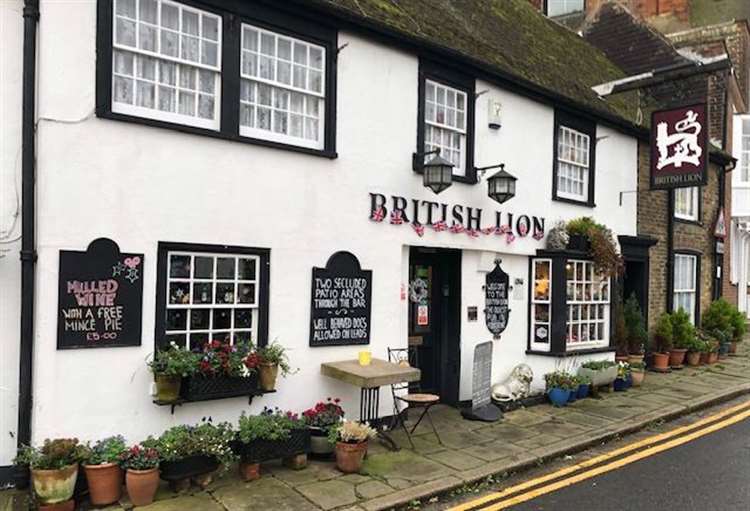
The building claims to date back to 1460 but the frontage must have
been changed considerably over the years
I’d already looked in the window of Kipps’ Alehouse, but this is
closed on a Thursday lunchtime, so we’d wandered further up Bayle
Street to The Guildhall. However, this is strictly a wet-led
freehouse and Mrs SD had her heart set on a bite to eat, so, purely
on the advice of the barmaid, we walked on until we reached this
most quintessential looking English pub.
Ducking through the low-level front door, we were warmly welcomed
and chose a table in the bar, not far from the open fire and found a
bench seat awash with Christmas cushions.
From the three ales on draught, I made the correct choice with a
pint of Courage Directors and she selected her usual Sav Blanc. It
was full-bodied and fruity.
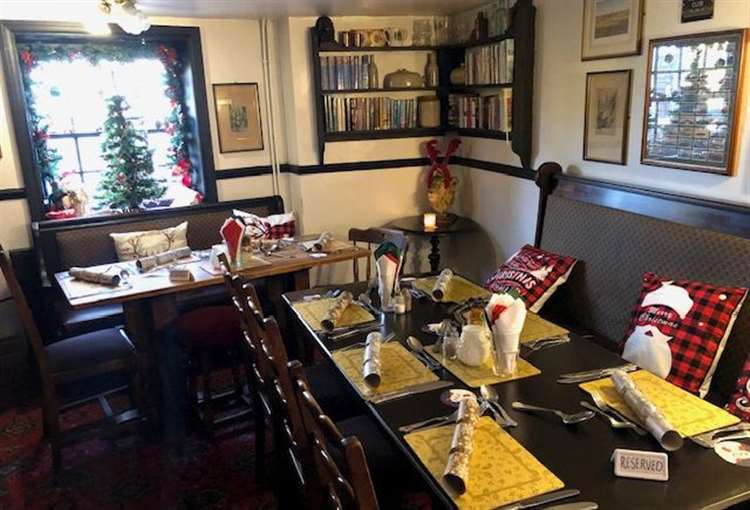
These tables were reserved, presumably for a Christmas lunch -
fortunately there were still plenty of festive cushions for our
bench seat too!
For lunch, I stuck with the winter warmer theme and went for a
turkey, smoked bacon and mushroom soup. She opted for a jacket
potato with beans and cheese and, while neither of these choices
might sound like full-on meals, when they arrived, we were glad we
hadn’t ordered more.
The landlady, like everything else about this pub, clearly takes no
nonsense and new trainee barman Alfie was certainly being put
through his paces.
My homemade soup was quite simply superb, served at the perfect
temperature and bursting with flavour. It arrived with a selection
of white and brown bread. The chef Nick popped down from the
upstairs kitchen briefly and I would have complimented him
personally but he only stayed long enough to put another log on the
fire before he was gone again.
People certainly know their jobs here and don’t mess about for long.
There’s a stack of lions, a mountain of true British memorabilia and
plenty of traditional ornaments about the place, but there’s no room
for frills or frippery, it just wouldn’t look right. And, on that
theme, you can forget darts, pool, fruit machines, a jukebox and TV
screens.
In fact, up until I got my second drink in, a Young’s Special
(another good pint but not in the Directors’ league), it had been
totally silent apart from the gentle babble from the locals and the
considerably more forceful tones of their landlady. These tones
briefly reached a new high when she trapped her finger in the door
of the dumbwaiter, though Alfie benefitted briefly as it wasn’t
wagged in his direction for a little while.
When Siri was commanded to provide background music, it was strictly
1970s Christmas classics and that festive German outfit Boney M was
swiftly followed by Cliff bleating on about Mistletoe and Wine.
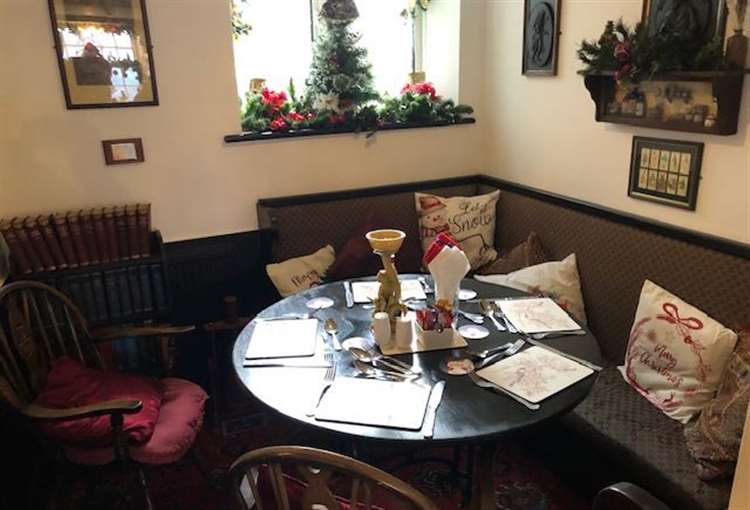
I discovered this round table, set for five, in its own separate
back room. I'm sure someone mentioned the British Lion has a room
dedicated to Charles Dickens, so maybe this is it?
The furniture is, as you’d expect, very brown and sits on a very
pub-like carpet, there’s beer mats aplenty, beer towels on the bar
and the food orders are handwritten on carbon paper before being
pinned up behind the bar – no-one would have it any other way,
including she who must be obeyed behind the bar.
The clientele is generally of a certain age and it’s not often we’re
the youngest ones in these days but the locals, who favour stools at
the bar, were friendly and chatty.
It’s definitely not the weather for it at the moment but there are
two small, separate, walled garden areas, one to the left and one to
the right, which can be reached through the French doors on the
raised area at the back of the bar.
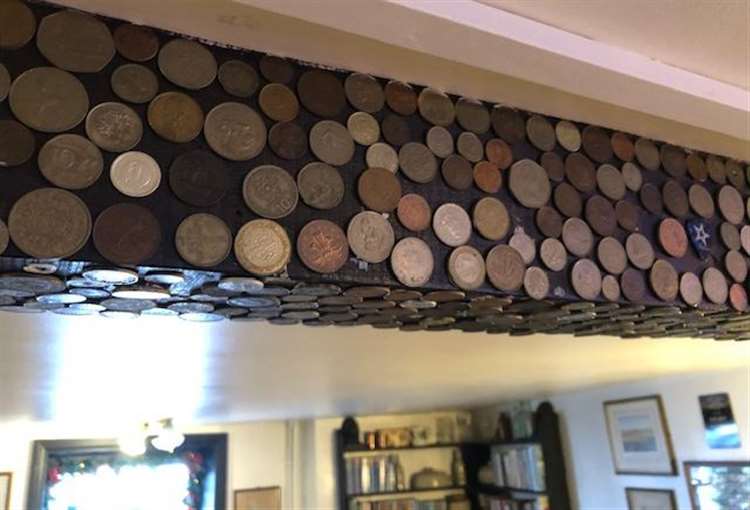
Coining it in! This beam must be worth a fortune - who added that
stray bottle top?
This area towards the rear of the pub is also where you’ll find the
facilities. The gents are in what is quite possibly the most
unusually-shaped room for a toilet. Like everywhere else, they are
wonderfully old-fashioned and stuck in time, though no-one could
accuse them of not being well cared for.
Back in the bar, the landlady was recounting a story about
forgetting to put the bins out. However, the story was cut short as
the kitchen summoned her and she brought out three fish and chip
dinners – which I must admit looked and smelt great.
With the dinners she also delivered all the usual accoutrements you
would expect, napkins, cutlery and a half pint pot packed with an
array of sauce sachets. However, this pot had one addition I’ve
never witnessed previously, a pair of scissors for cutting the
packets open.
It was time for us to leave but as we were departing, trainee barman
Alfie asked one more question as he didn’t know what PC stood for on
one of the orders taken by the landlady.
When I quipped the one thing it definitely doesn’t stand for here is
‘politically correct,’ our hostess was in full agreement, saying
there’s far too much of that in the world today. I can confirm it
is, in fact, short for prawn cocktail here – of course it is.
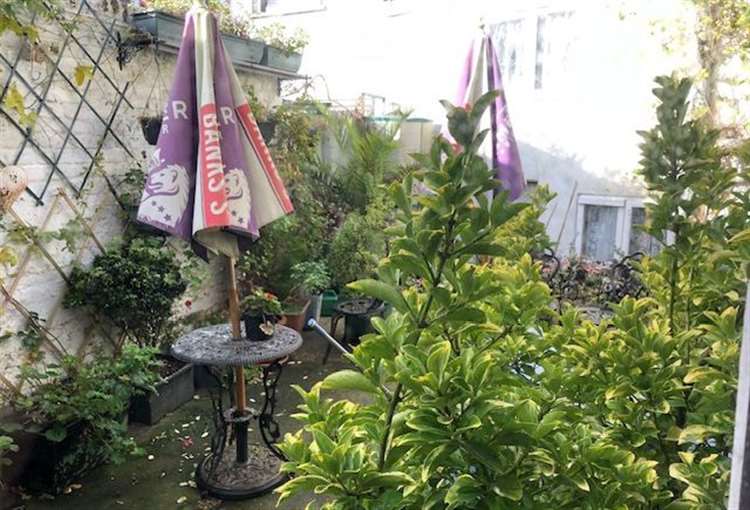
This secluded little walled garden patio can be found through the
French doors at the back.
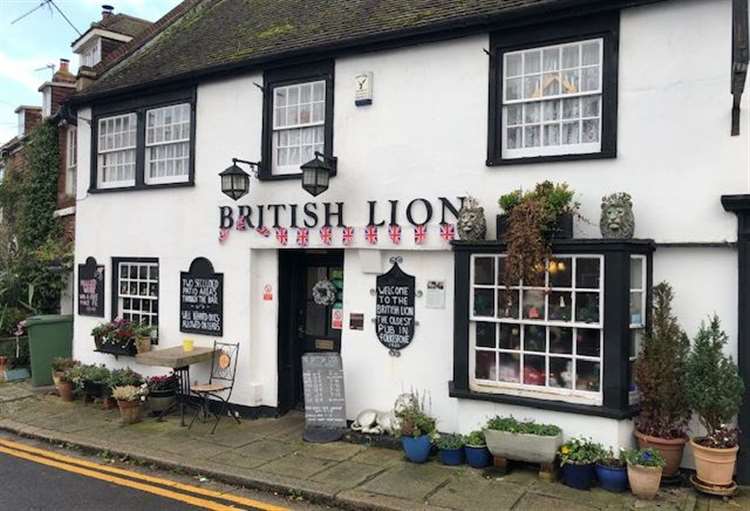
Sitting right on the roadside of The Bayle in Folkestone, the
British Lion is the town's oldest public house.
Décor: Reassuringly ‘olde worlde’ with furniture and fittings that
wouldn’t look out of place at you nan’s house. It looks as it should
ie. As if it has evolved over the years. ***
Drink: The Courage Directors came recommended and I found it creamy,
very tasty and fulsome, just right for a blustery, winter day. The
Sauvignon Blanc certainly passed muster. ***
Food: Without doubt homemade, the soup was divine and the cherry pie
with custard was a great pub pud. The jacket spud came piping hot
and there was so much I had to help Mrs SD with it. ****
Price: It was £13 for a large Sav Blanc and a pint of bitter. The
jacket potato (with cheese and beans) was £9.50 and my soup was £7.
The cherry pie and custard was £7 and I noted a mulled wine and
mince pie was £5. ***
Staff: Alfie was new and learning on the job but was keen and
cheery; he was also taking the initiative wherever he was allowed.
Our landlady was an upbeat force of nature around whom the rest of
the pub revolves. ****
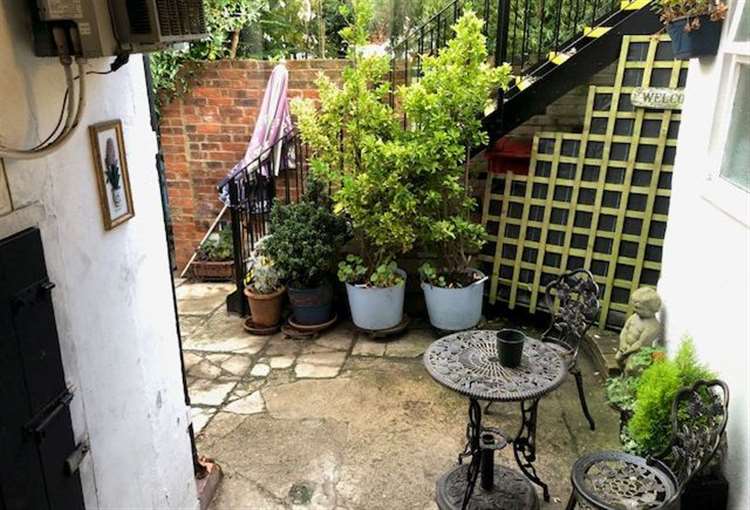
Slightly less crowded and congested than the garden on the
right-hand-side of the pub, this patio area is located to the left.
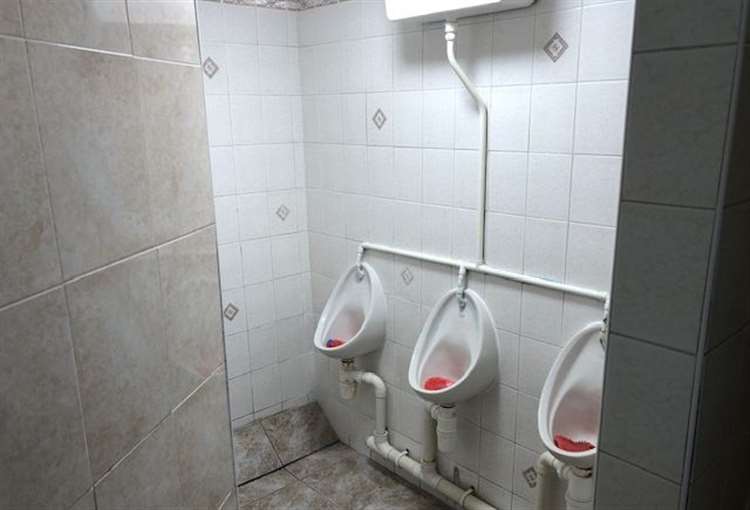
Everything inside the gents was clean, tidy and well-maintained,
they'd certainly made the best of an unusually-shaped room. |
LICENSEE LIST
LADD John 1782-1802

LIFE ROBERT 1804-06
LIFE William 1806+

RIGDEN 1806-09
FORMAGE Robert 1809-15

FORMAGE Elizabeth 1815-17+
FORMAGE Ann 1819+
WEEKS Mary c1823-25
 
WEEKS Edward 1825-28+
 
CROWTHER John 1839-40+
 
LIFE Martha 1841+ (age 65 in 1841 ) )
BOYLE/FOWLE Richard
 1841-Aug/46
(age 35 in 1841 1841-Aug/46
(age 35 in 1841 ) )
 
BURVILLE Robert Aug/1846-64
    (also carrier age 57 in 1861
(also carrier age 57 in 1861 )
(Dover Street )
(Dover Street
 ) )
 TAYLOR John 1864-76
(age 58 in 1871
TAYLOR John 1864-76
(age 58 in 1871 ) )
 
COOPER William Wills 1876-83
 
BROOKWELL Jesse 1883-87

PANKHURST James 1887-1912+
     (also fly proprietor age 45 in 1901
(also fly proprietor age 45 in 1901 ) )
PANKHURST Harry 1913-29
  
STANNARD Edward David 1929-39
  
STANNARD Josephine Marie 1939
UDEN Charles 1939-57

 HOURAHANE "Gerry" Richard 1957-77
HOURAHANE "Gerry" Richard 1957-77

HOURAHANE Joan 1977-86

HOLLETT Kenneth 1986-90

CLAYSON Brian 1990-94

MATTHEWS Brian & WHITE Sandra 1994-99

CLARK Bruce & CLARK Margaret 1999-2000

CLARK Bruce & GRANT Denise 2000-04+

GRANT Nickolas & Dee to 2017+
 From the Pigot's Directory 1823 From the Pigot's Directory 1823
 From the Pigot's Directory 1828-29 From the Pigot's Directory 1828-29
 From the Pigot's Directory 1840 From the Pigot's Directory 1840
 From Bagshaw Directory 1847 From Bagshaw Directory 1847
 From Melville's Directory 1858 From Melville's Directory 1858
 From the Post Office Directory 1874 From the Post Office Directory 1874
 From the Post Office Directory 1882 From the Post Office Directory 1882
 From the Post Office Directory 1891 From the Post Office Directory 1891
 From the Kelly's Directory 1899 From the Kelly's Directory 1899
 From the Post Office Directory 1903 From the Post Office Directory 1903
 From the Kelly's Directory 1903 From the Kelly's Directory 1903
 From the Post Office Directory 1913 From the Post Office Directory 1913
 From the Post Office Directory 1922 From the Post Office Directory 1922
 From the Kelly's Directory 1934 From the Kelly's Directory 1934
 From the Post Office Directory 1938 From the Post Office Directory 1938
 From More Bastions of the Bar by Easdown and Rooney From More Bastions of the Bar by Easdown and Rooney
 Census Census
|






















